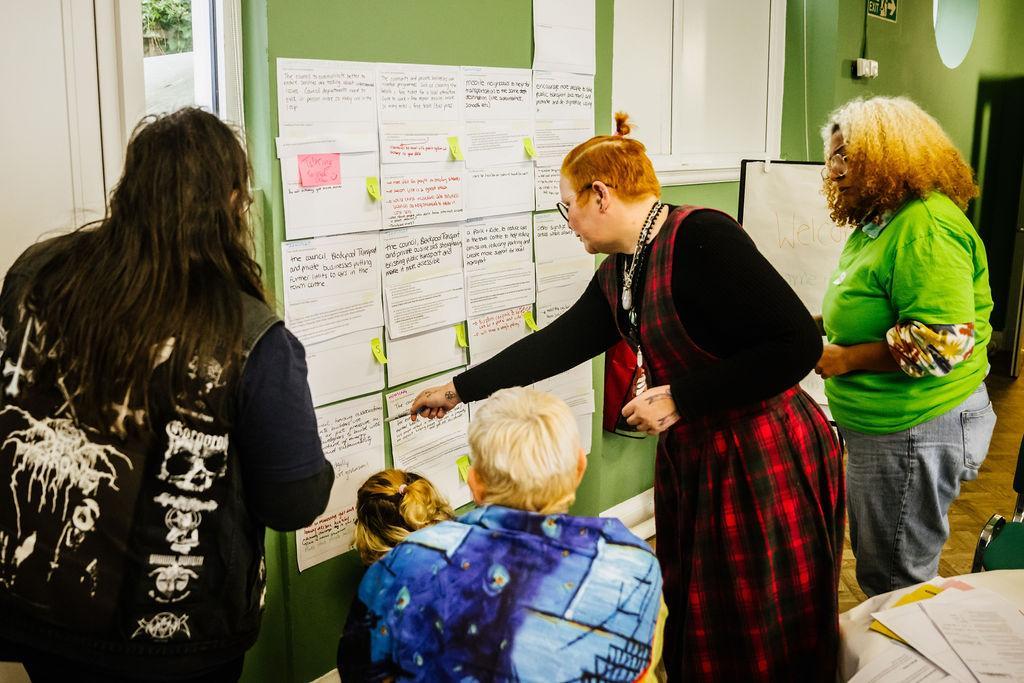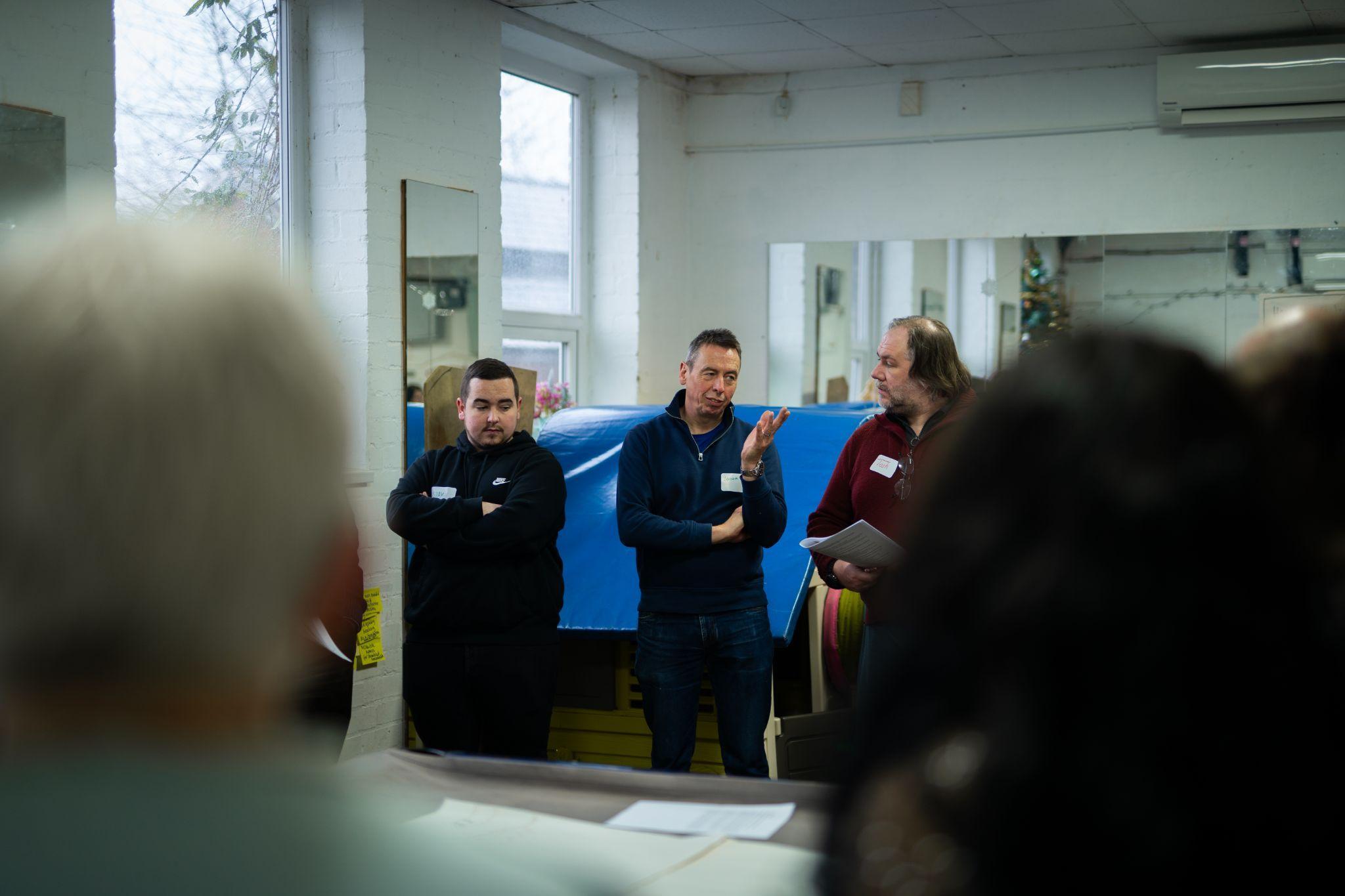Final report January 2025
GatesheadResidents Forum

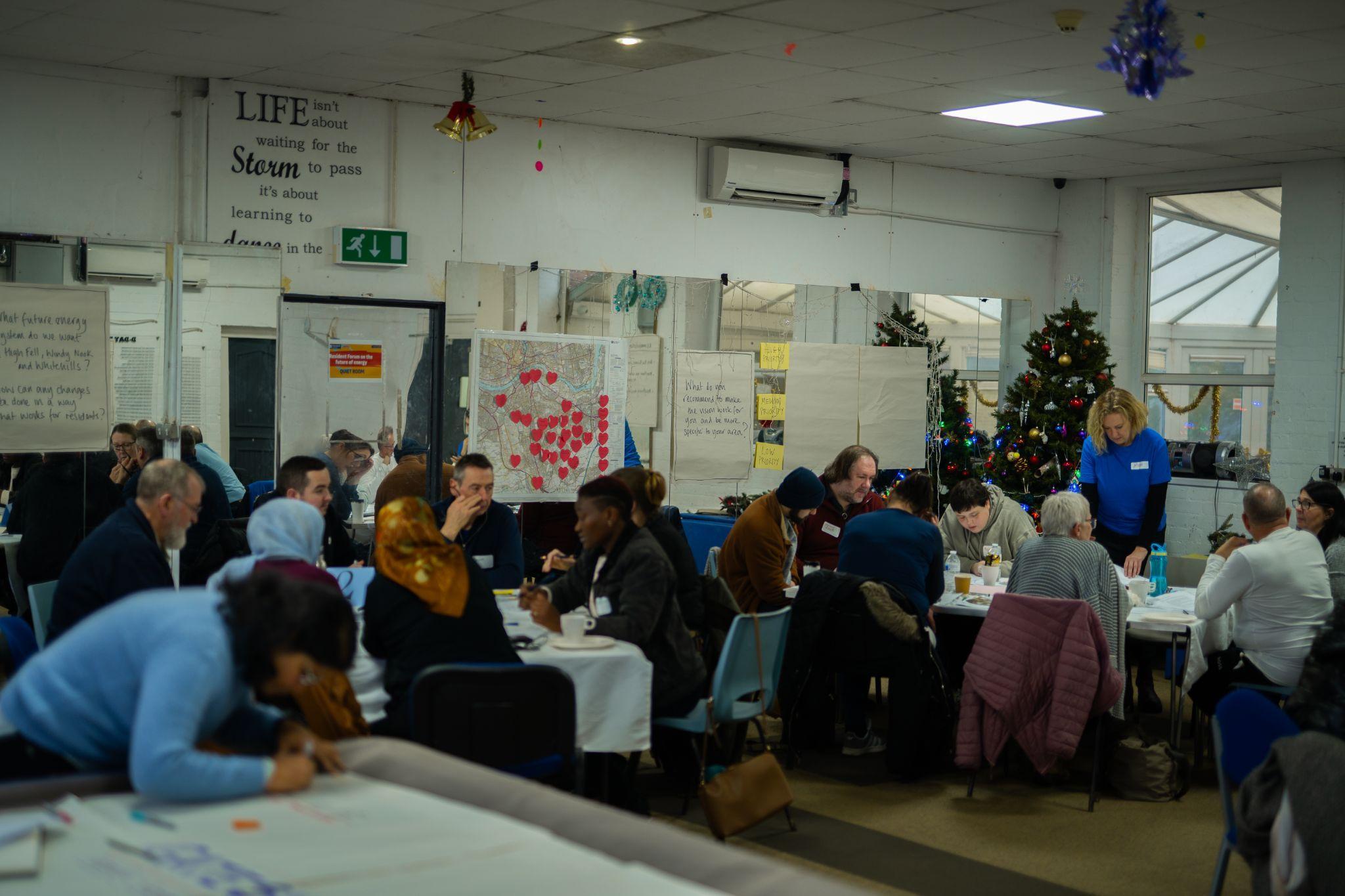

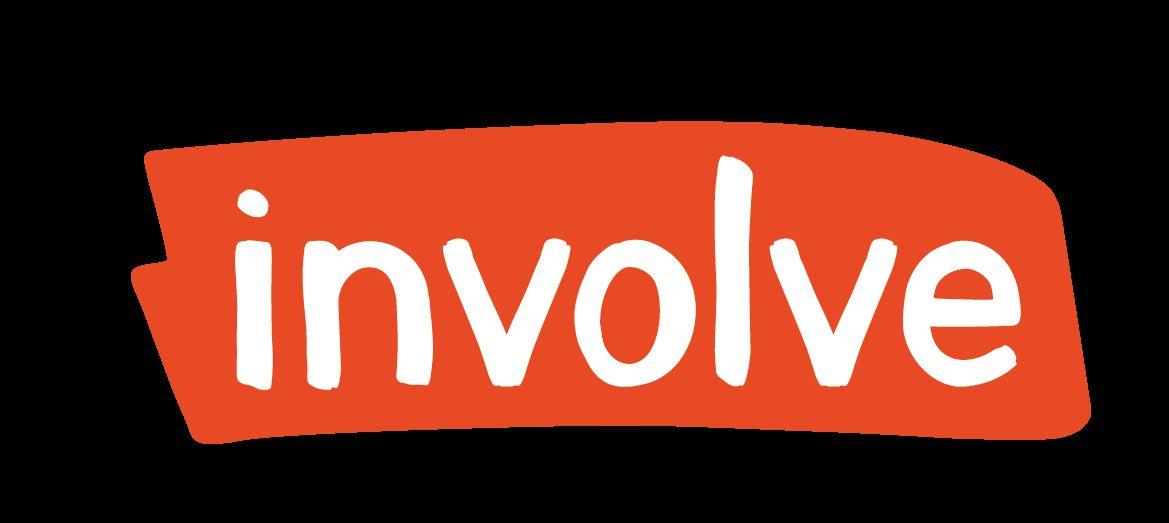



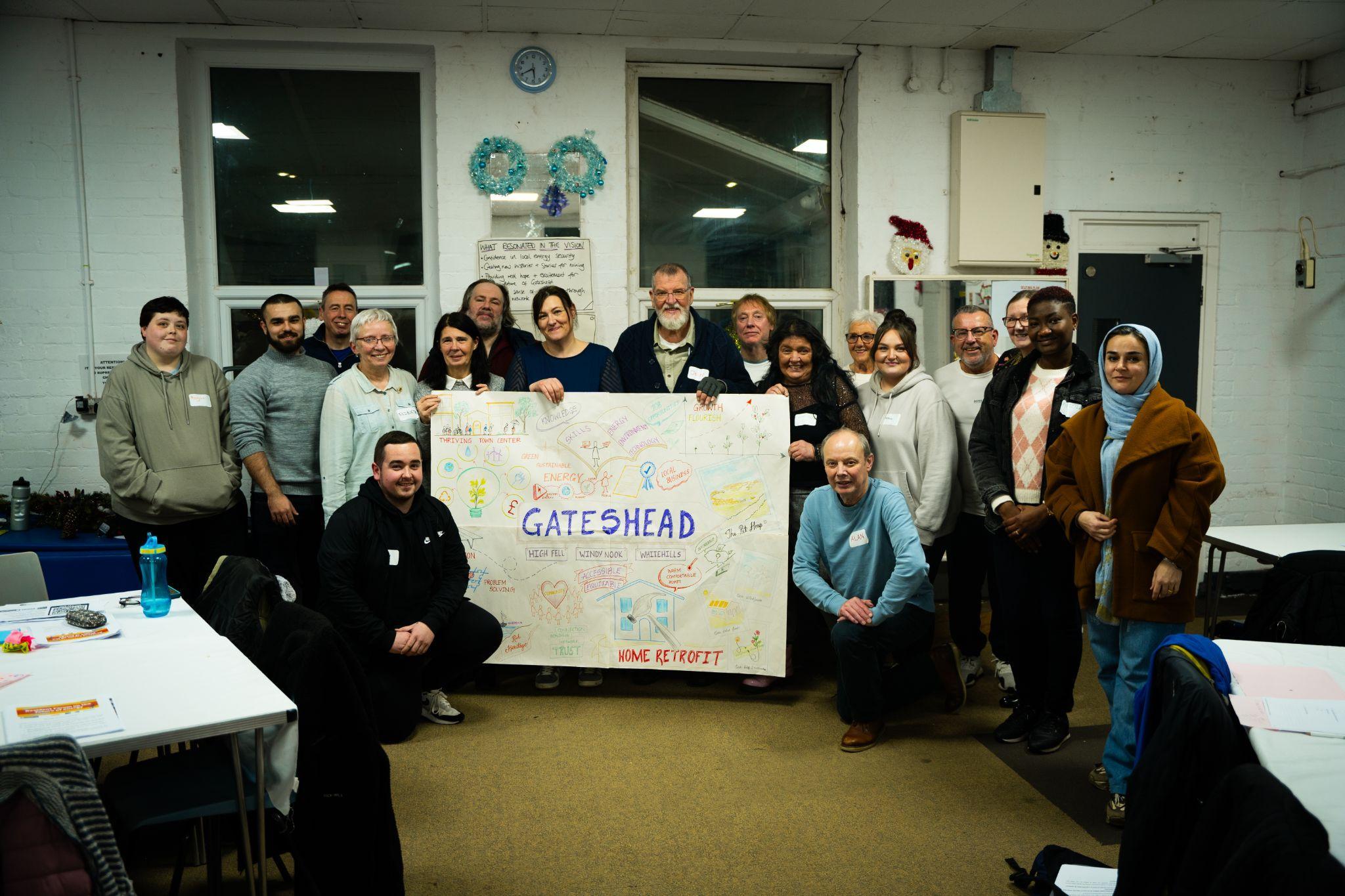


Withthanks
With thanks to the 20 residents who contributed their time, energy and ideas to the Gateshead Residents Forum on the future of energy in Windy Nook, Whitehills and High Fell:
Abbie, Abdul, Alan, Amanda, Audrey, Chris, Elzbieta, Graham, John, Josh, Linzi, Mandy, Maria, Megan, Paul, Philip, Priscilla, Sarah Jane, Shabnam, & Shay.
With thanks to Innovate UK who funded this work as part of the Net Zero Living programme.

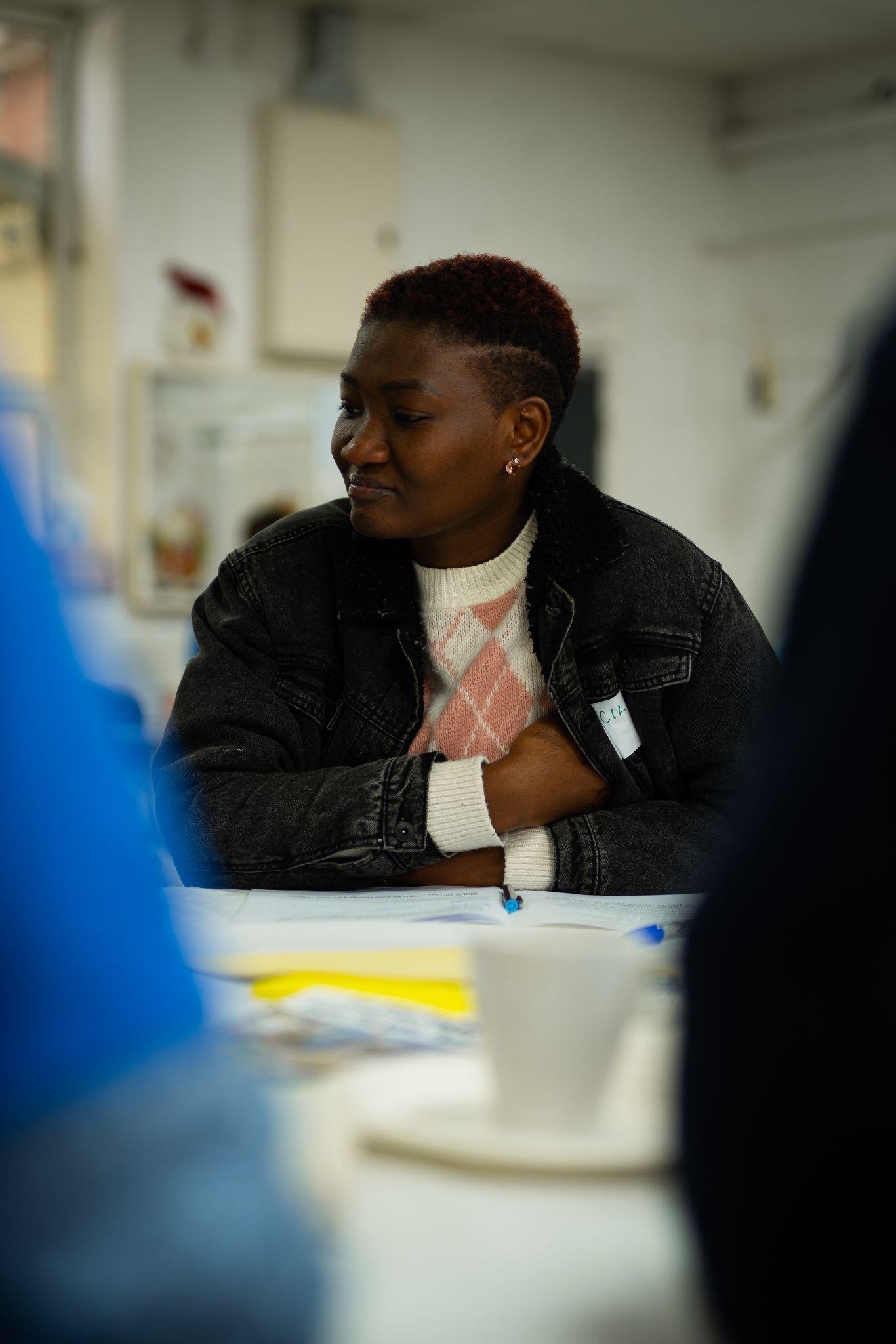
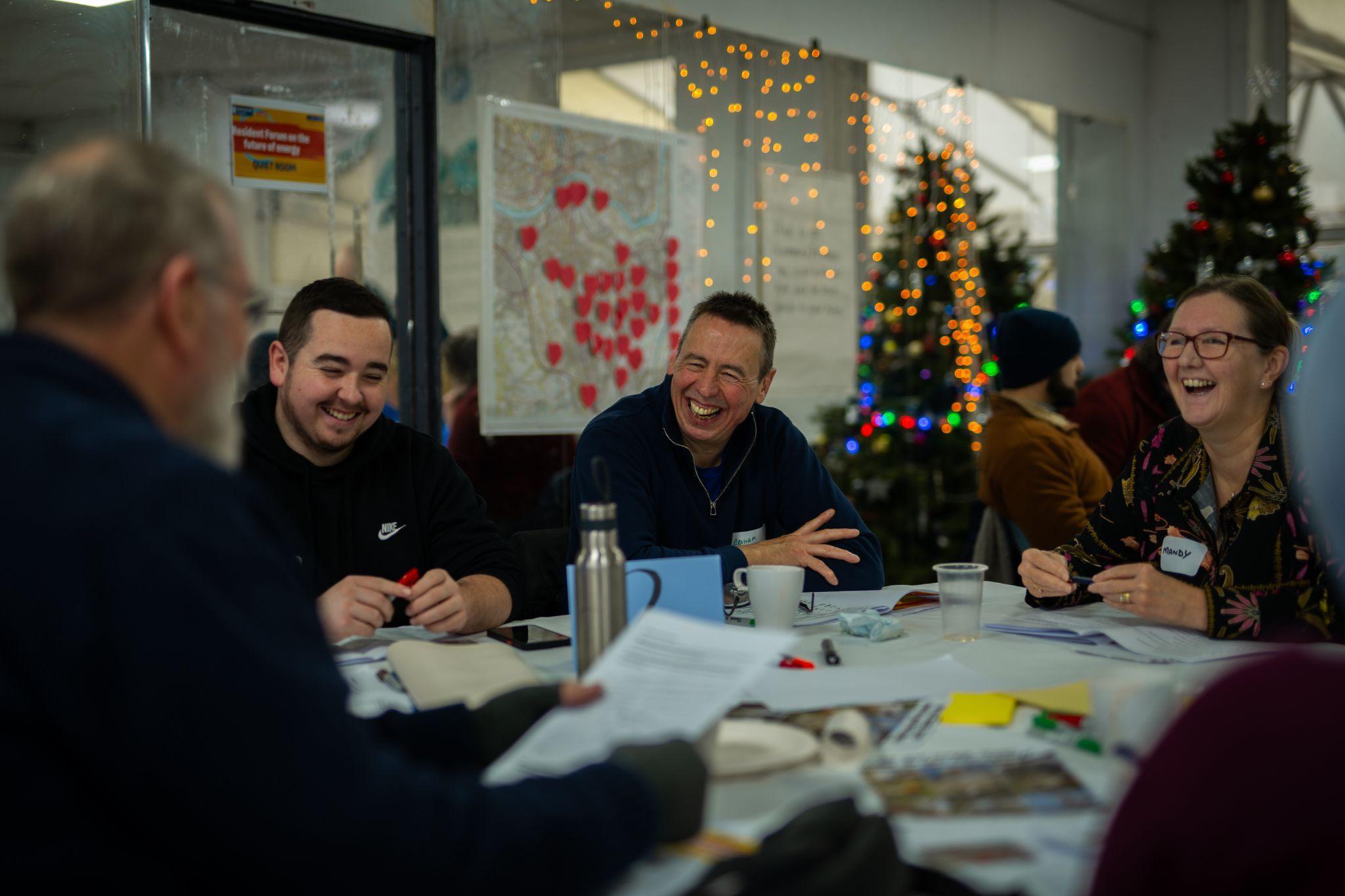
Thank you to our actors and facilitators

Executivesummary
As part of Innovate UK’s Net Zero Living programme, Involve, Forum for the Future, Ipsos and Quantum Strategy & Technology ran a Residents Forum on the future of energy with residents. The aim was to put citizen ambitions for the future of their wards at the heart of the Council’s energy strategy.
In December 2024, 20 people, selected by civic lottery to reflect the community were brought together (see Who took part?). They were asked to answer: What future energy systems do we want in High Fell, Windy Nook and Whitehills? How can any changes be done in a way that works for residents?
Through 4 in-person sessions, the group explored what was important for their future, learnt about energy and how it was changing, and what was happening in Gateshead from a range of speakers.

The group used what they had heard from speakers, the advisory group and wider actor session, as well as their own lived experience, to agree a vision and set of recommendations for the future of energy in High Fell, Windy Nook and Whitehills.
In response to the group’s recommendations, The Council will:
● Publish this report and the recommendations on the council website
● Publish a formal response to all recommendations, incorporating responses from other parties who may be responsible
● If there are any recommendations the council is unable to take forward, the reasoning will be clearly set out and alternatives will be suggested
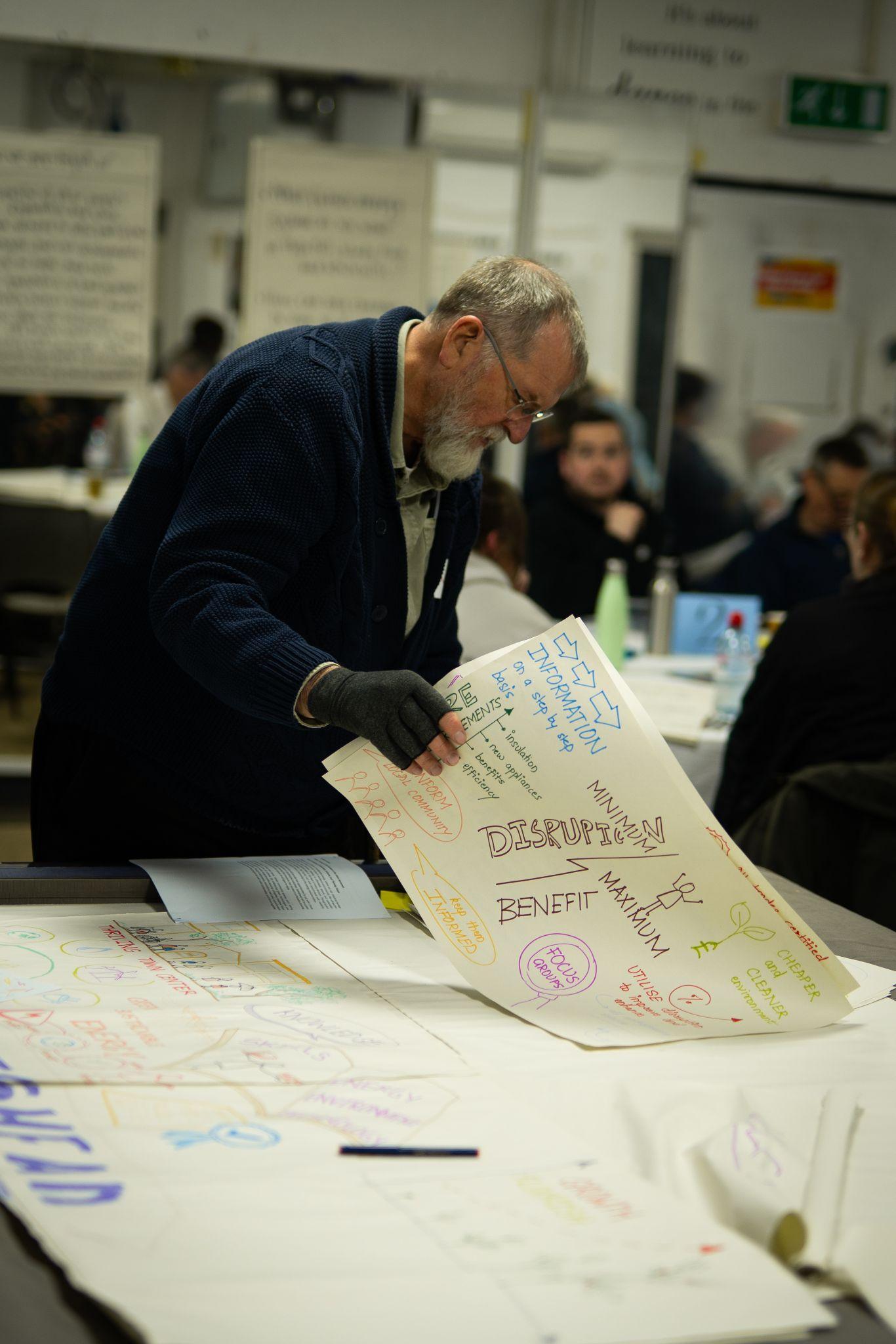

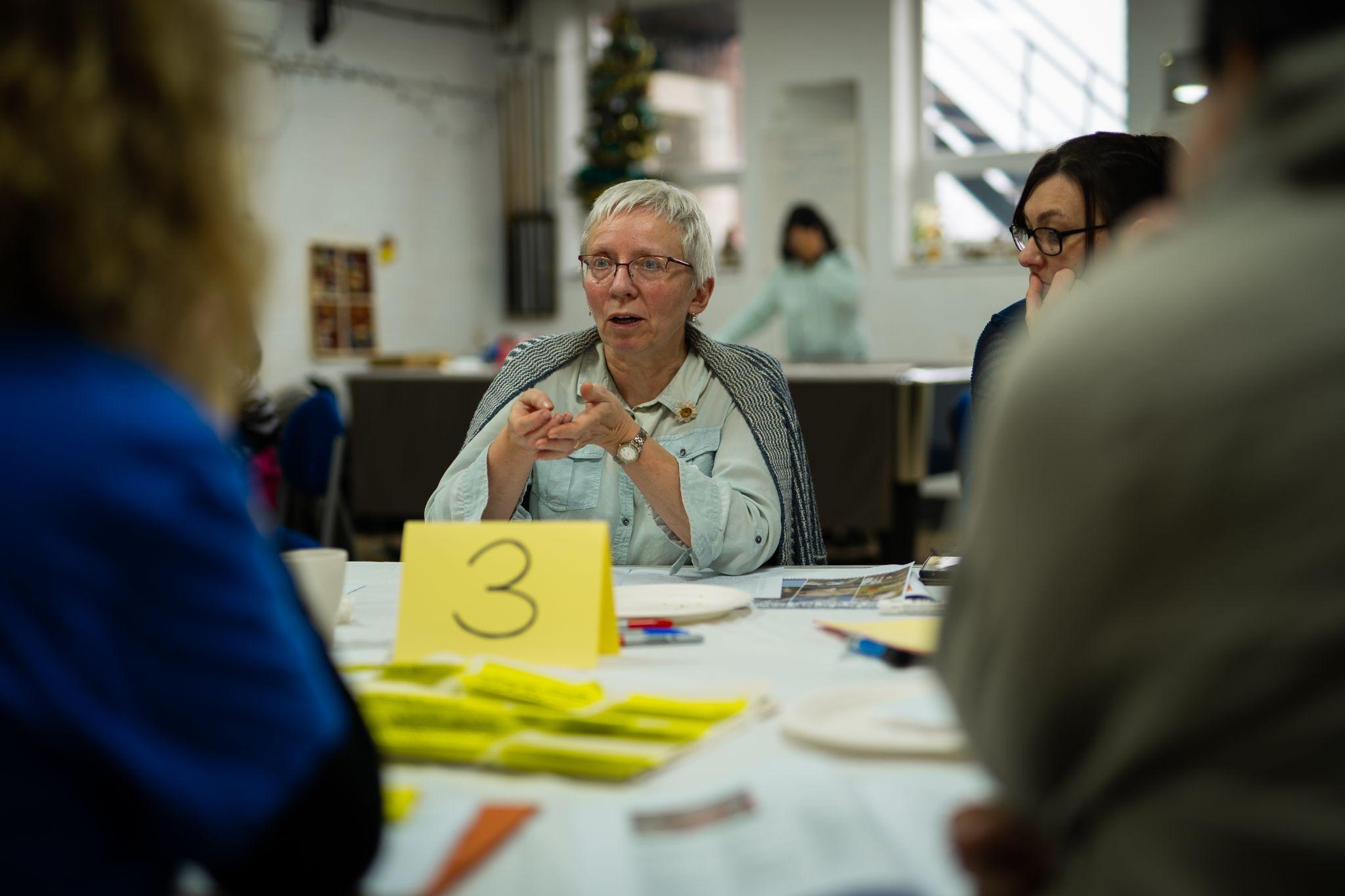

Background

Projectorigins
Why energy?
Gateshead Council has been working on energy provision over the last few years to ensure energy security and respond to the climate crisis. This includes the development of a District Heat Network. The Council is keen that its energy future is shaped by residents and any changes that are made support what people already value about their areas and have wider benefits.
The Residents’ Forum is an important part of this process, focused on High Fell and Windy Nook and Whitehills wards. 20 people, selected by civic lottery to reflect the community, were asked to offer recommendations to the Council on the future of energy. The vision and recommendations will inform how these Wards, and Gateshead more widely, gets and uses energy and also inform the wider council strategy.
Why citizen visioning?
Often the people affected by important programmes of work on energy, climate change and net zero are not involved. Citizen visioning gives residents more ownership over changes being made and aims to overcome barriers with public acceptance, by meeting residents where they are. It enables residents and decision makers to develop a bigger picture view that looks into the future, responding to local assets, needs and what makes each place unique, that can then shape action and ensure that it works. The primary benefits of this approach is that residents are engaged in decisions that affect them and provide guidance on the approaches to take. This increases buy-in to, and workability of, subsequent actions and changes.
What question did this process set out to answer?

What future energy systems do we want in High Fell, Windy Nook and Whitehills?
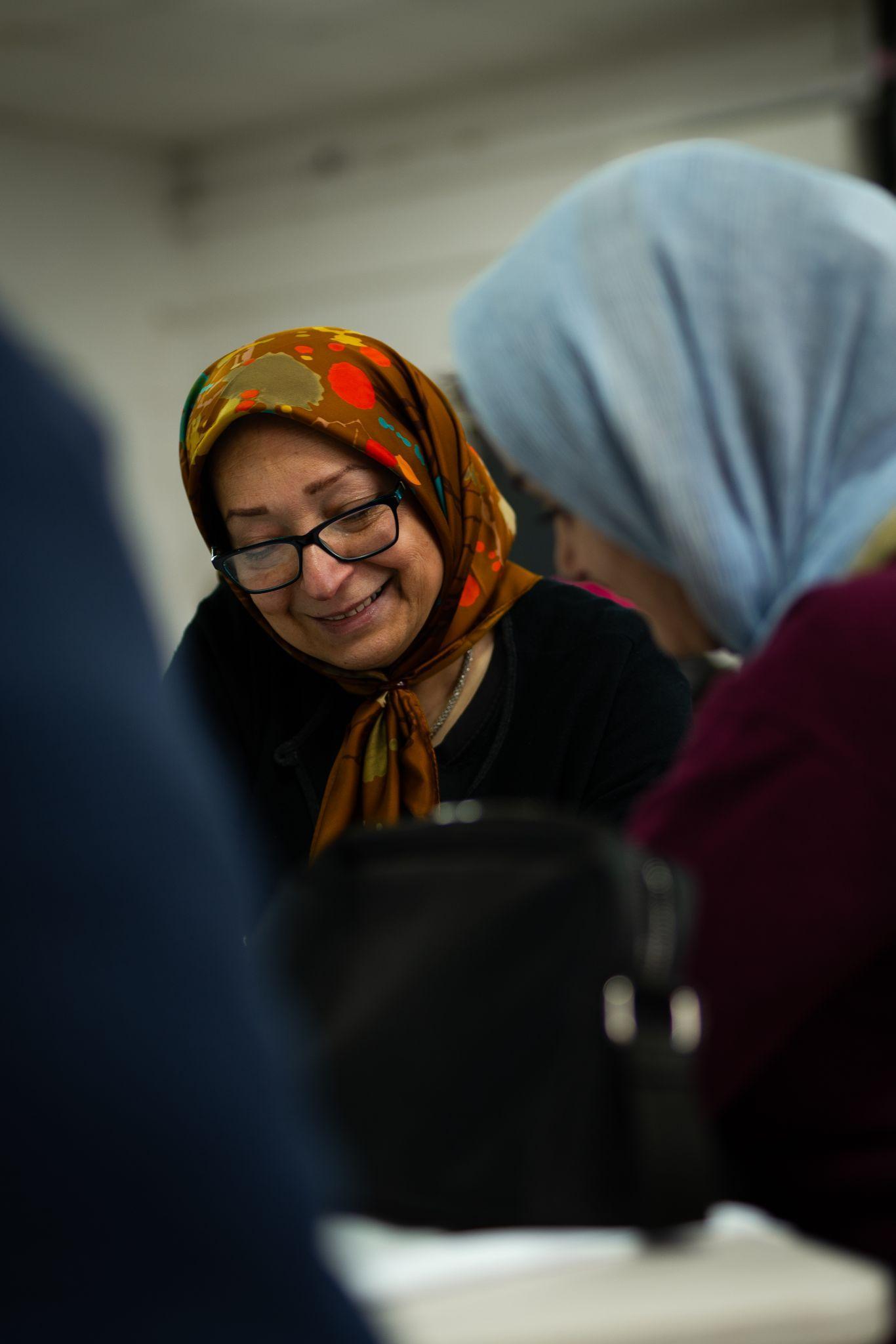
How can any changes be done in a way that works for residents?
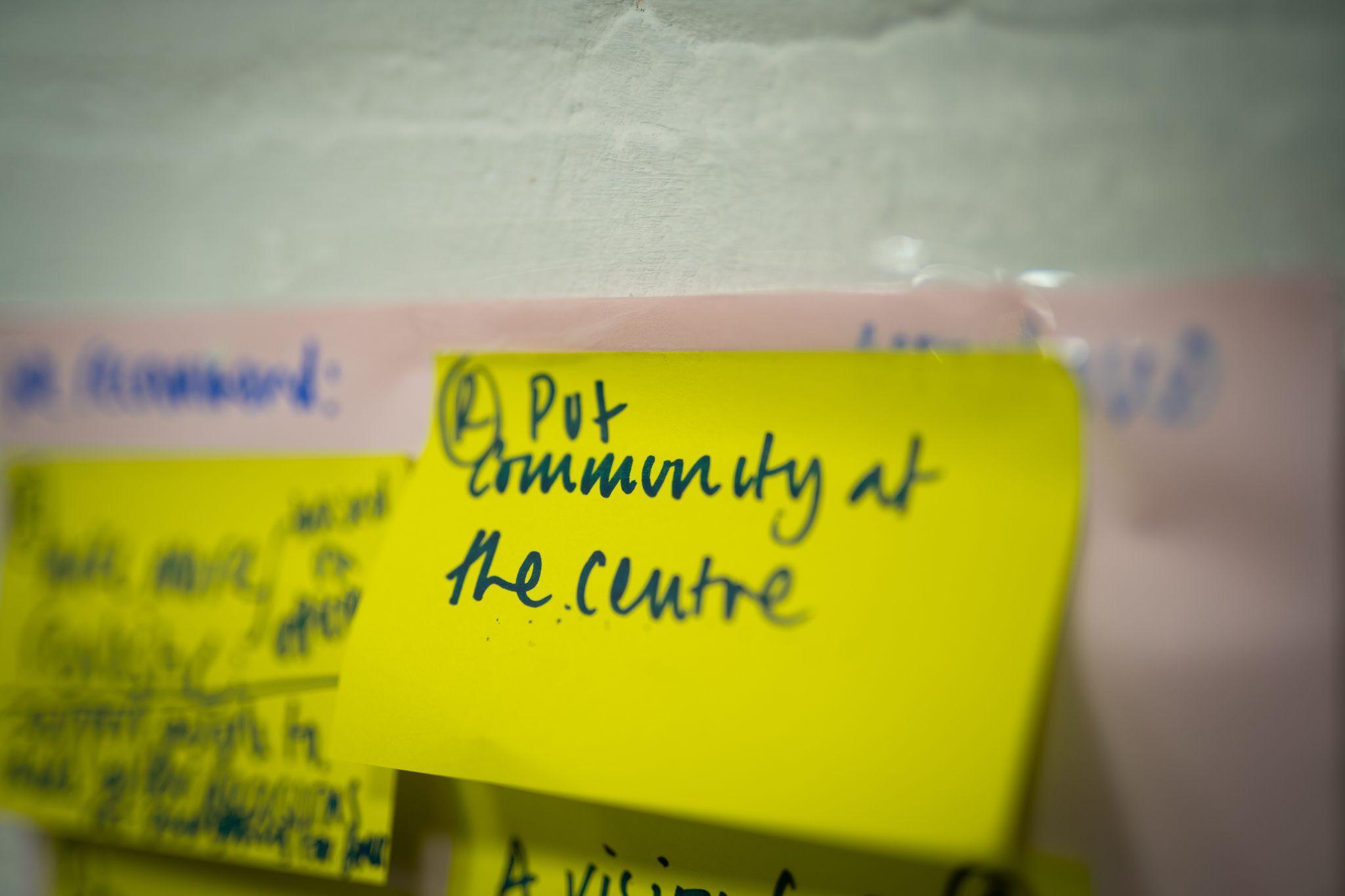

Thequestion
What future energy systems
do we want
in High Fell, Windy Nook and Whitehills?

How can any changes be done in a way that works for residents?

OverviewofCitizenVisioning
Reflecting&Learning Deliberation
Participants reflected on what they valued about where they live and what they want to keep and change. They learnt about the topic from a range of speakers. Topics covered an introduction to the energy system, climate change and district heat networks.
Participants discussed the information they had heard and developed a long list of ideas, weighing up potential ways forward. The council’s climate team was on hand to review them and provide feedback.
Decisionmaking
Participants worked together to agree on:
● A final vision statement
● A set of priority recommendations



Whatwedid
The residents came together in four in-person sessions over the course of a month.
The first Saturday was designed around the principle of building out from what is important to people, rather than being driven by an ‘outside in’ agenda of reaching net zero. Residents worked together to identify what they valued about their area, what they would like to change and what the future could hold.
Alex Robertson from ReGen gave an introduction to the energy system and how it needs to change over the next few years. Residents then reflected on what they valued in the energy system and started to identify key features of their energy future.
Two evening sessions following, with speaker providing information on the energy challenge, the implications of climate change and how the Council was responding. We then heard about the solutions that were available - from district heat networks to retrofit. Having heard a range of inputs, participants were asked to refine their vision elements and identify initial recommendations for the Council.
An advisory group of actors - those that had the resources, power or ideas to make changes to energy in Gateshead - met in the middle of the process, with council staff, to offer advice and suggestions for the recommendations.
In a final day long session, residents prioritised and refined their vision and recommendations and presented them back to Gateshead’s Council’s Climate Change Lead.
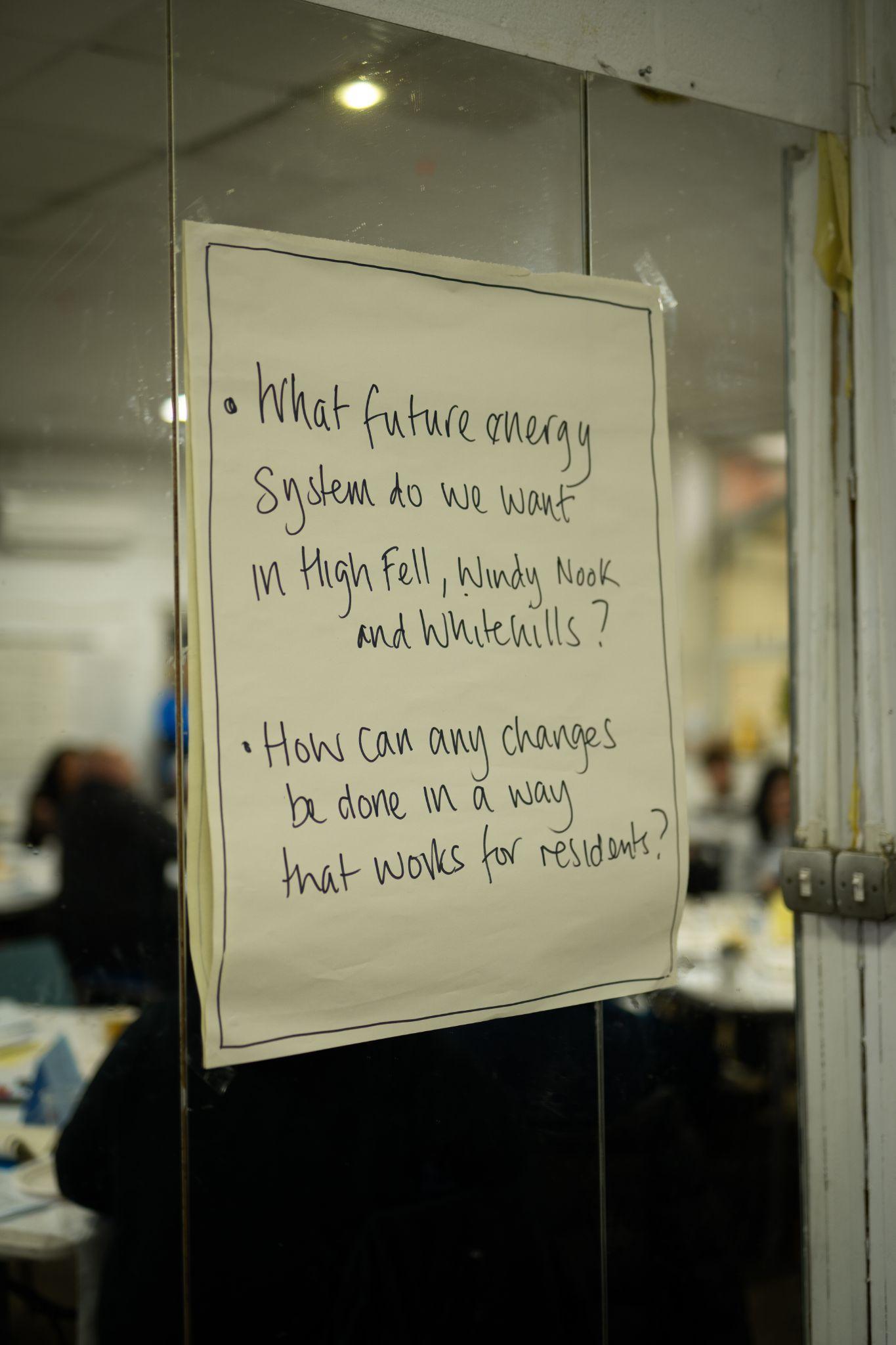

Thankyoutoourspeakers
● Wayne Taylor, Energy Operations Team Leader, Gateshead Council
● Alex Robertson, Local Net Zero Project Manager, ReGen
● Councillor John McElroy, Cabinet Member & Portfolio Lead –Environment & Transport
● Yvonne Gill, Energy Funding Officer, Gateshead Council
● John Hart, Strategic Stakeholder Manager for the North East and Yorkshire Net Zero Hub
● Louise Turner, Tyndall Centre for Climate Change
● Michael Smith and Faye Doughty, Northumbria University
● Helen Ryder, Community Energy England
● Jim Gillon, Energy Services Manager
Thankyoutoouractorsandadvisors
North East and Yorkshire Net Zero Hub; North East Combined Authority; Northumbria University; Gateshead Colleges; Contractors; Newcastle Climate Action Network; Gateshead Citizens Advice Bureau; South Tyneside Council.
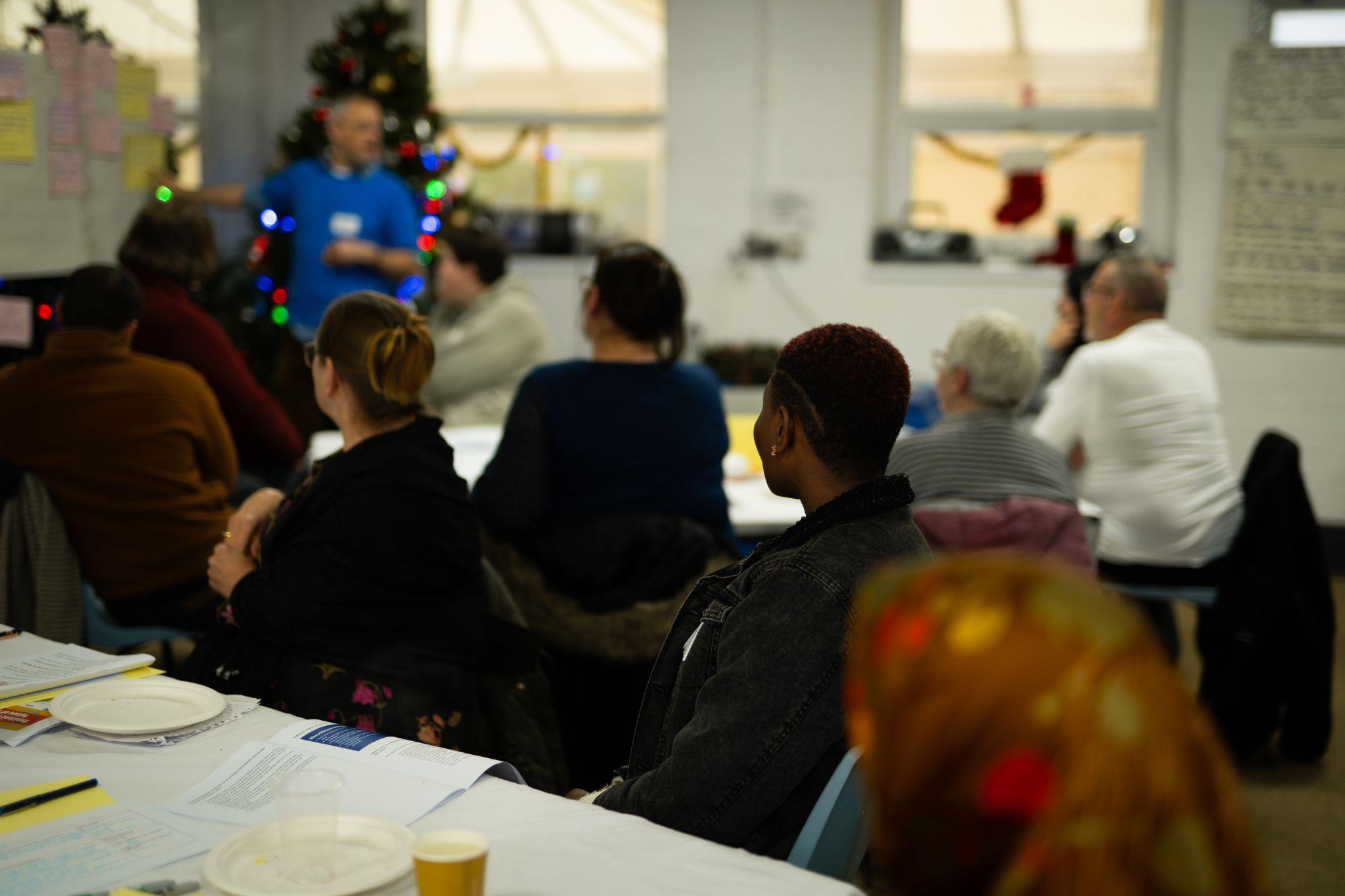

Whotookpart?
Whotookpart?
In total, 20 people, recruited to broadly reflect the population of Windy Nook & Whitehills and High Fell, deliberated and agreed the vision and recommendations
The Forum members were selected through a process called sortition (or civic lottery).
Howwereparticipantsselected?

4,000 letters were sent to randomly selected households across the two wards, inviting people to register their interest in taking part.
From there, 22 people were selected by computer to be broadly reflective of the city in terms of their:

Members of the group were given a £315 gift of thanks for participating in all sessions, to make participation accessible to all and in recognition of their time. We also covered travel and any additional costs such as childcare.
● Age
● Gender
● Ethnicity
● Disability
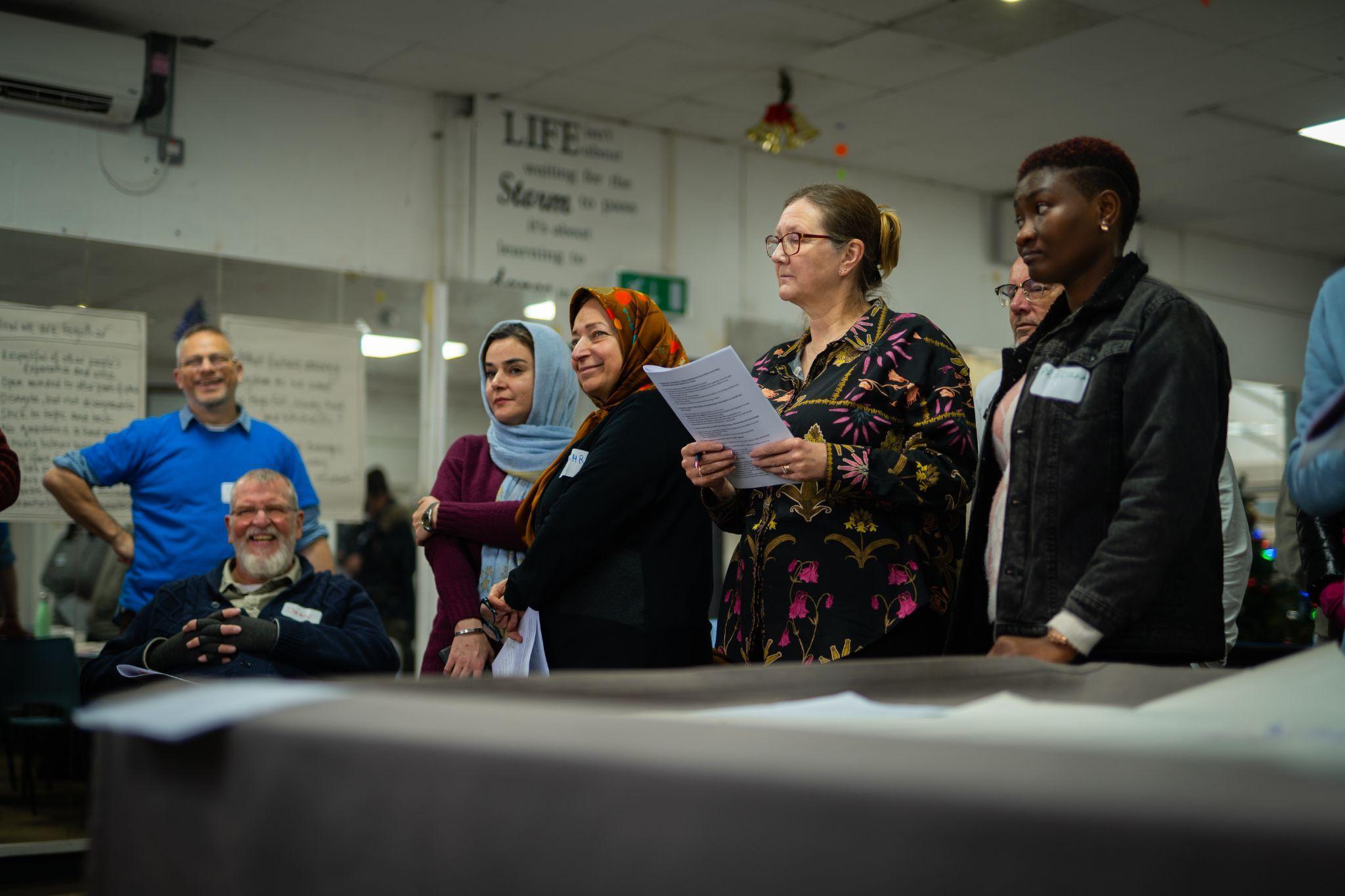
● Location
● Housing tenure
● Attitudes to climate change
This process, known as sortition, is well-recognised as the gold standard for recruiting a group to be reflective of a wider population.
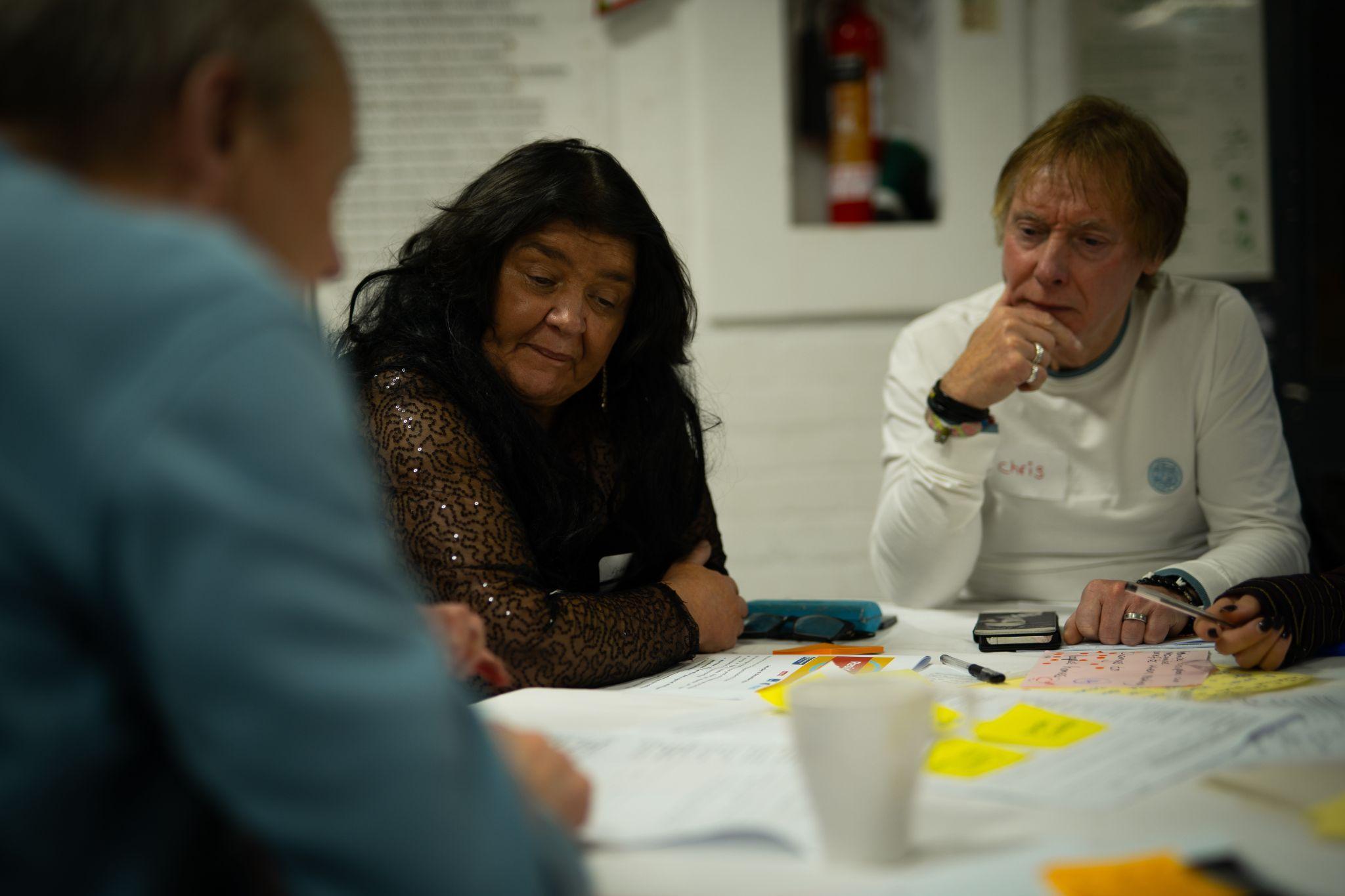
Makeupofthegroupataglance
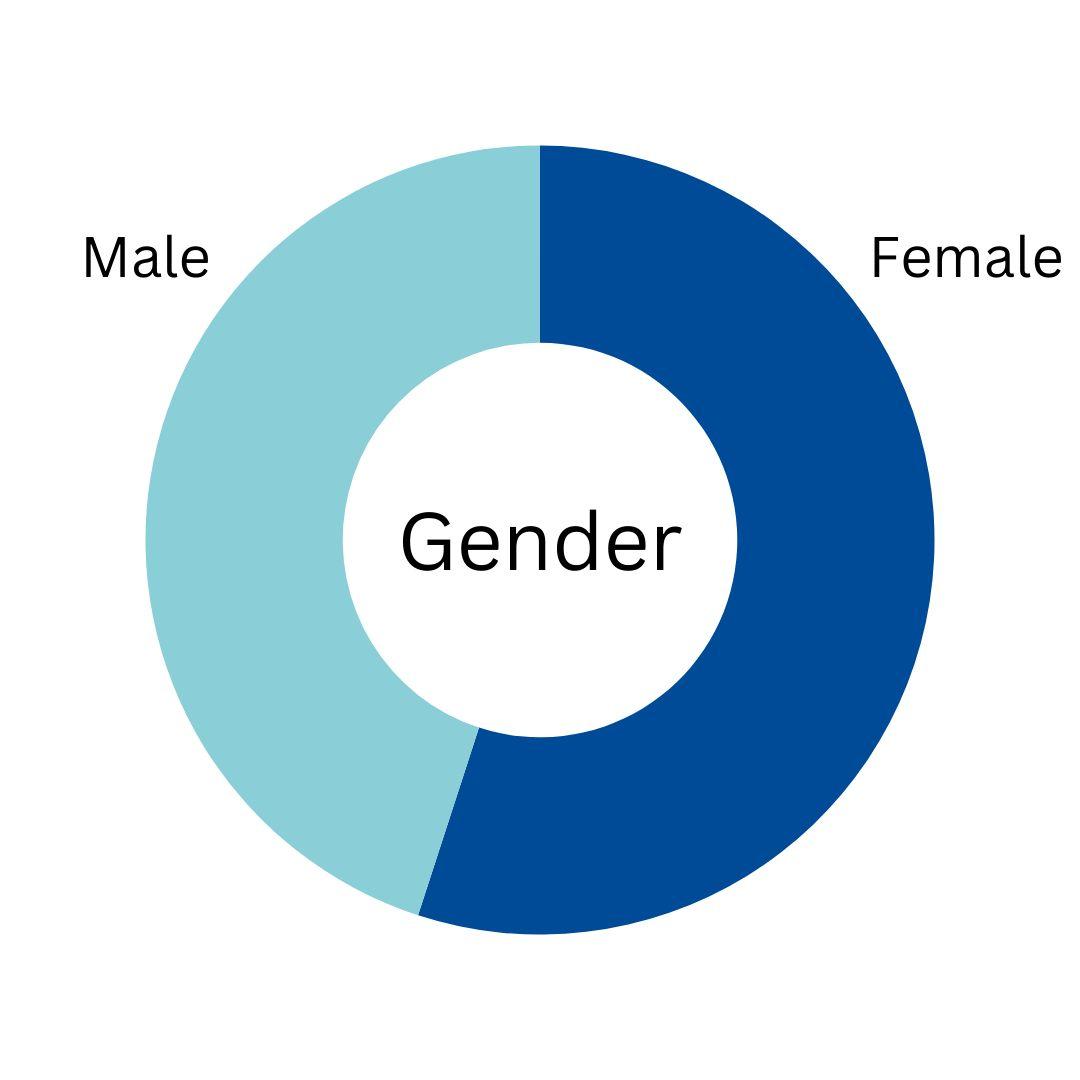
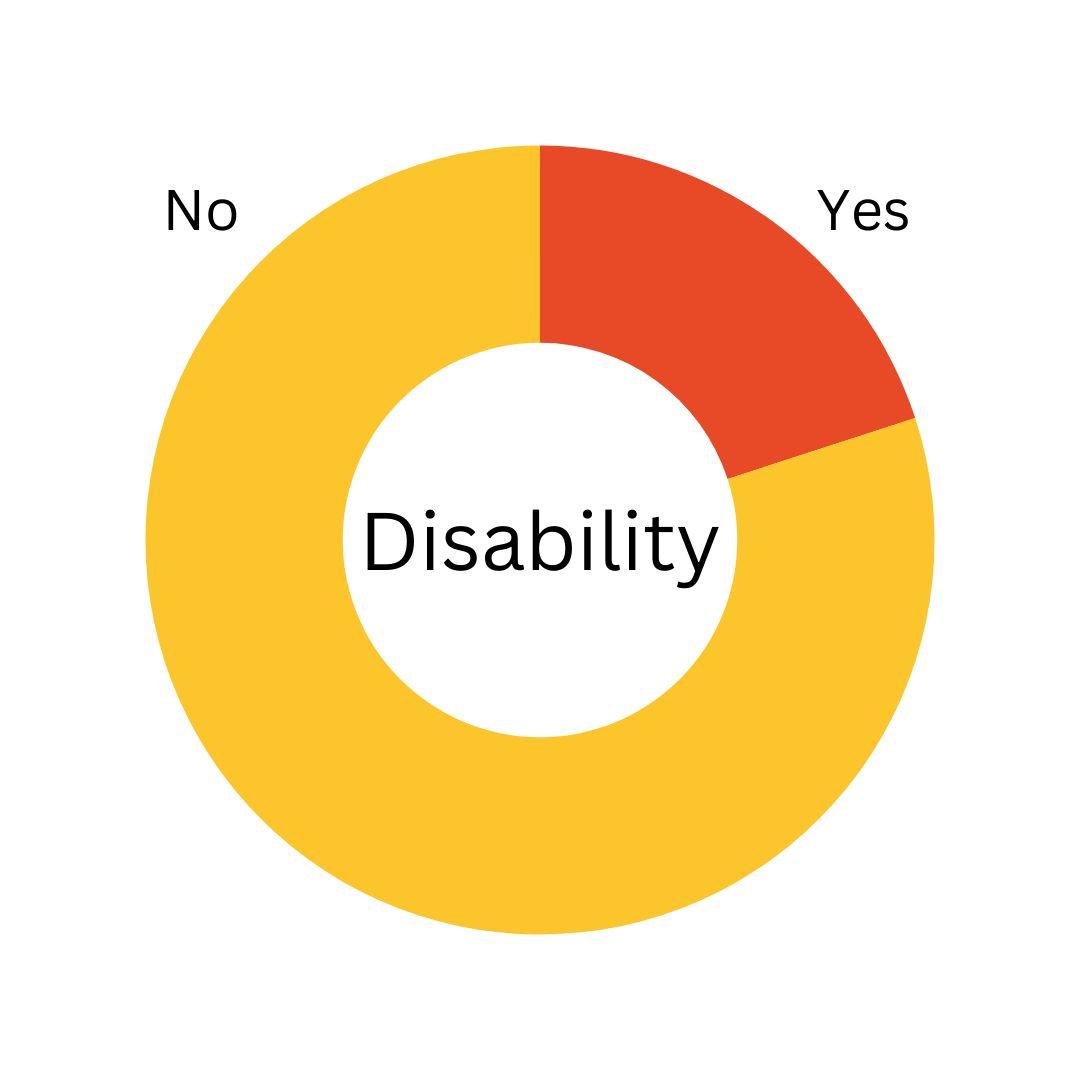
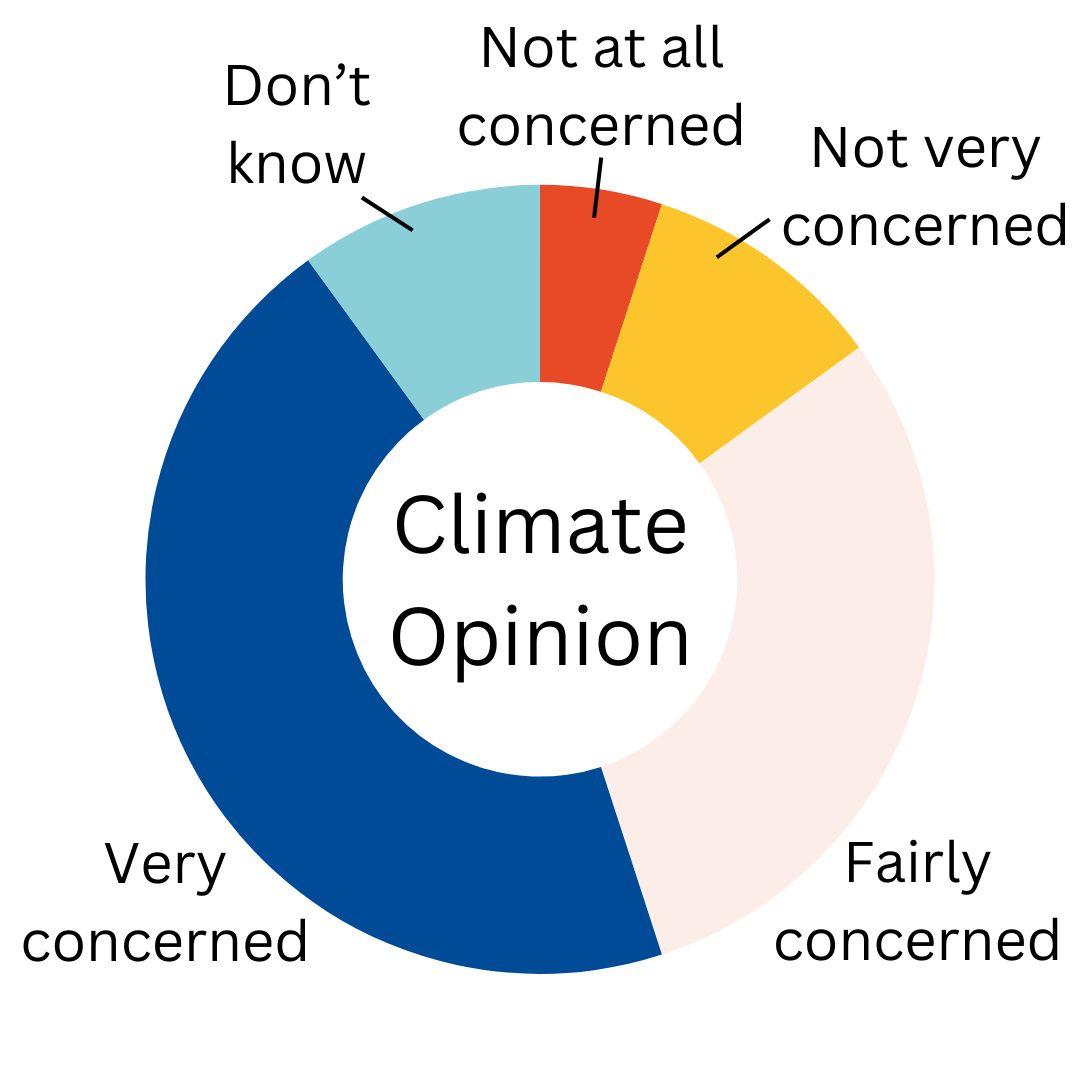
Please see the following slides to see how this compares to the town as a whole.
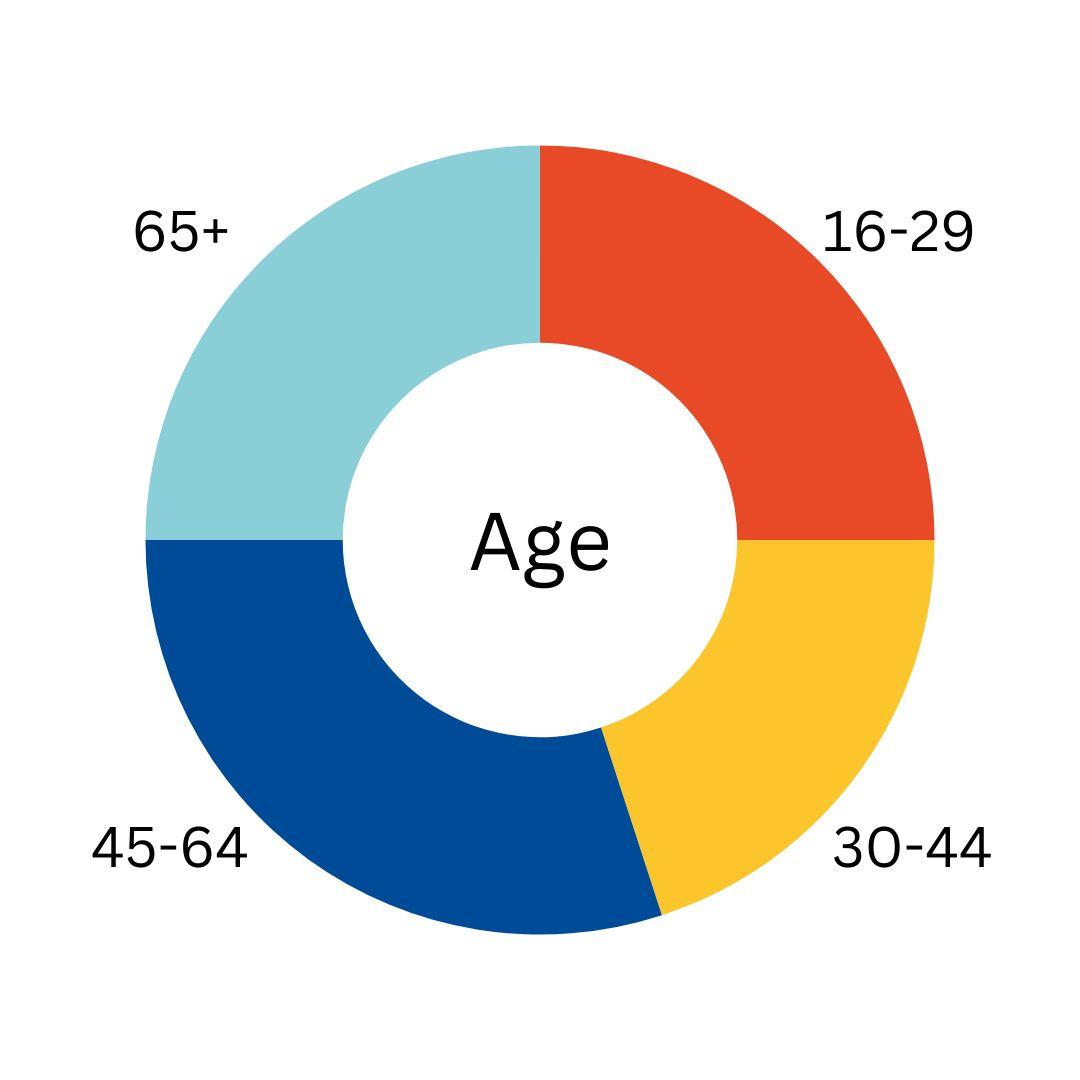
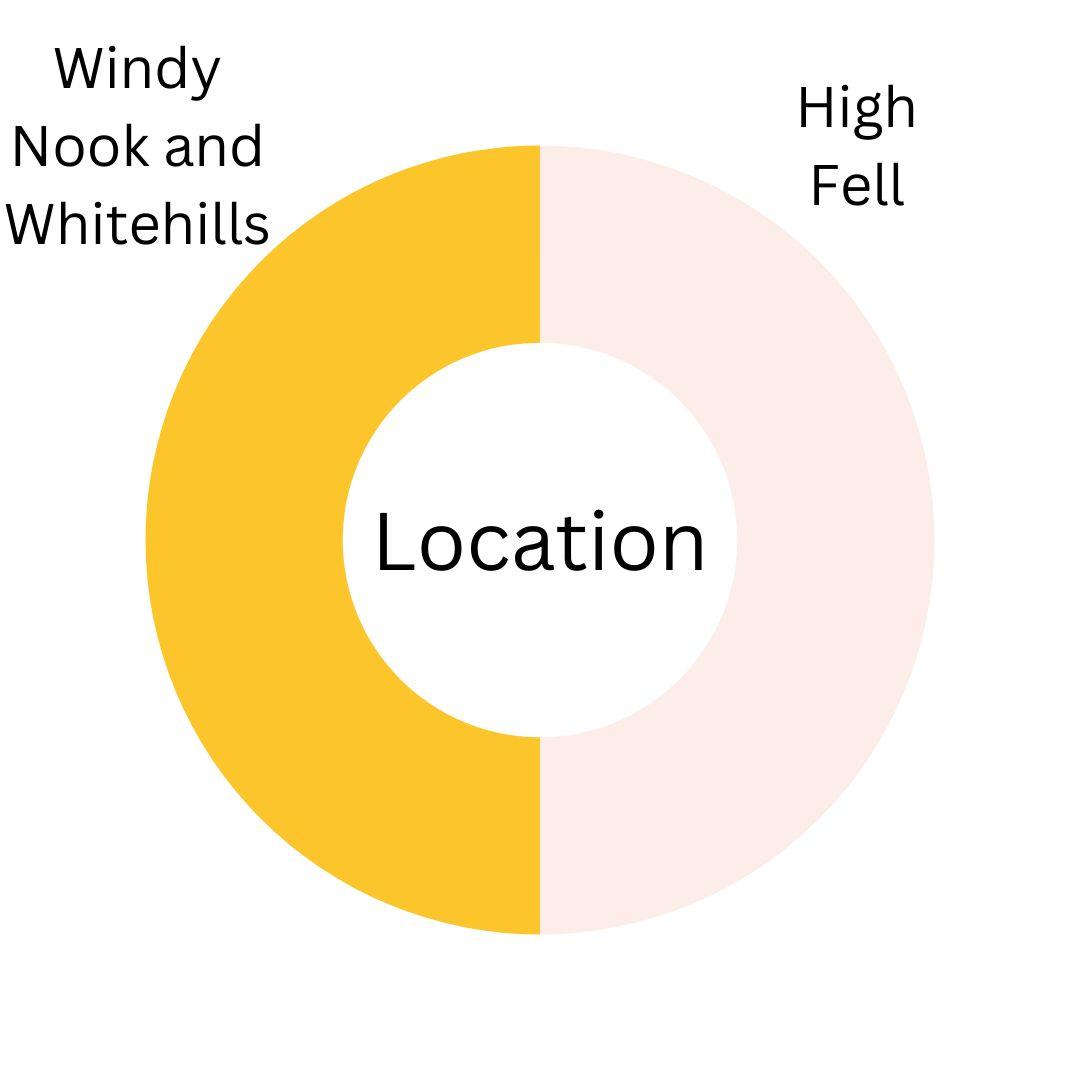

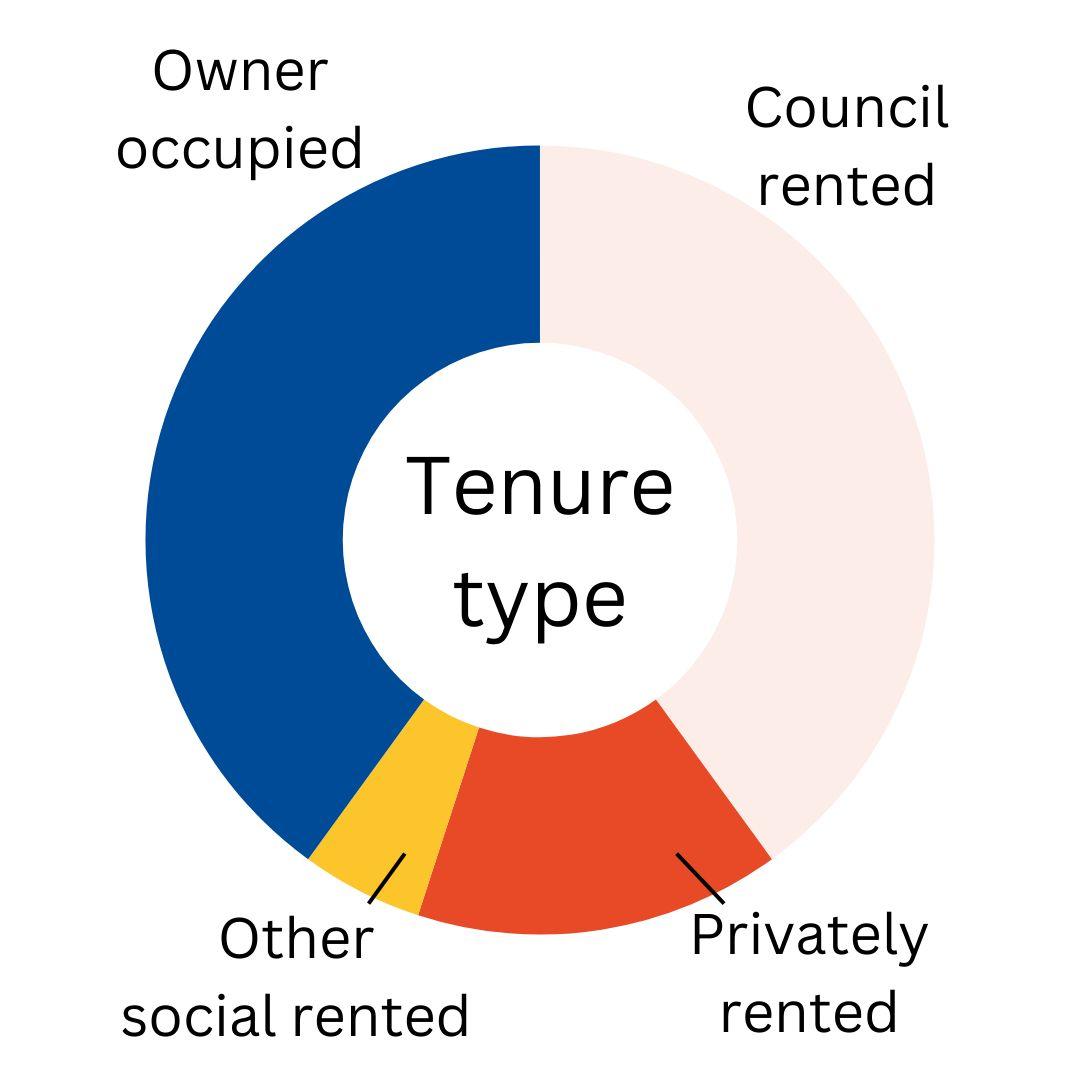
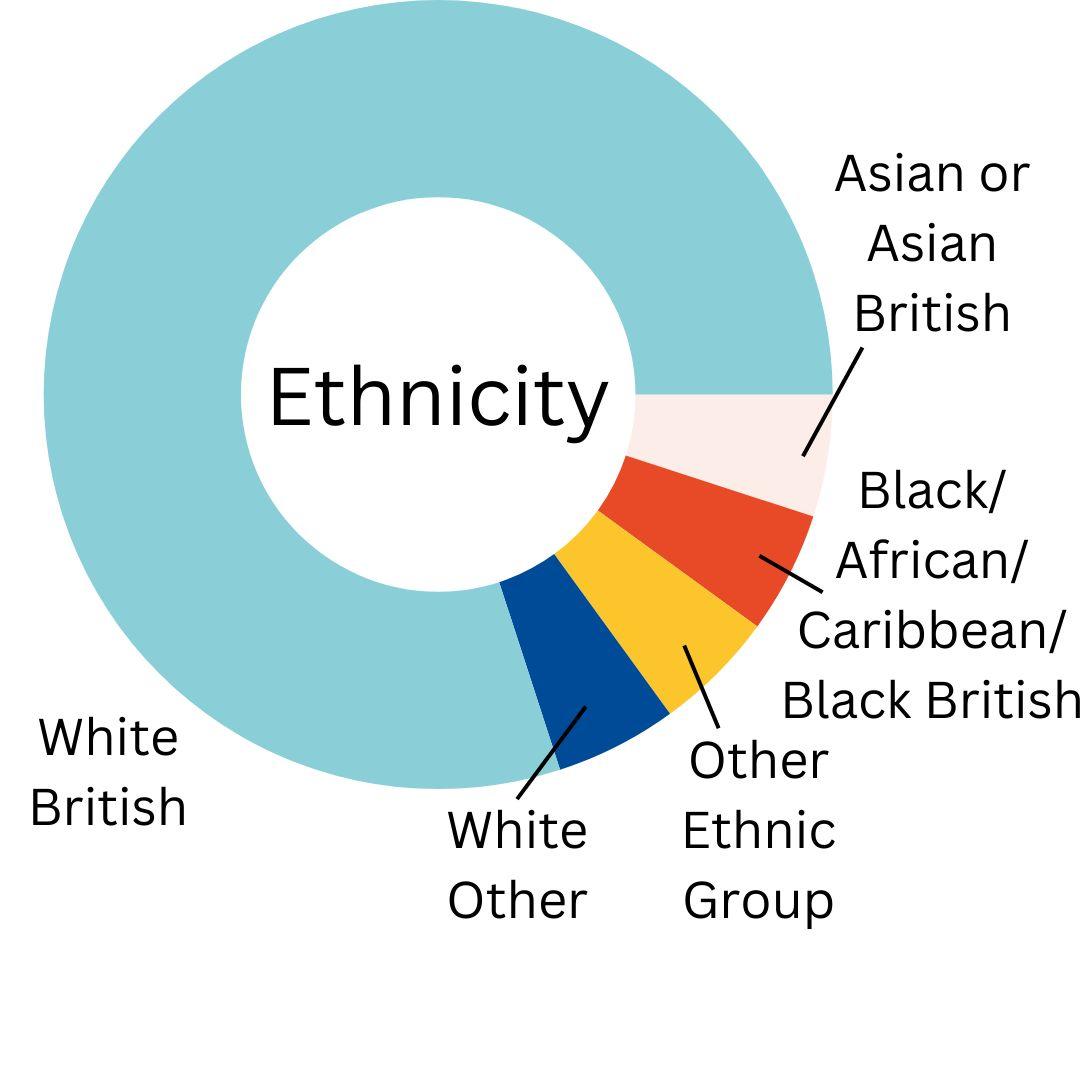


Recruitmentdetail
We agreed these recruitment criteria with Gateshead Council to ensure the final group would have a good spread across demographics and attitudes.
The recruitment of participants achieved a good spread of people across all criteria, even where slight variations from targets occured.

20 participants took part, broadly reflective of the town across demographics
1 visionstatement developed by the group, written in participants’ own words
9 speakers provided information and evidence about the topic

21 personhours of learning, conversations, deliberation and writing recommendations
10 final recommendations deliberated, agreed and written in participants’ own words


Visionand recommendations

OurvisionforGatesheadin2035
This vision statement was drafted from scratch in participants’ own words
By 2030 Gateshead will be a beacon of a shared commitment to create a vibrant and attractive place with a dynamic, thriving town centre and protected green spaces for all to enjoy. Gateshead will be a place where we have a trusted, transparent, proven relationship between the community and its local authority, to allow people to have a sense of ownership.
The strong partnership between council and communities, including local businesses will create a green economy focused on accessible skills and education in sustainable industries. Our tradition of innovation and entrepreneurism built on centuries of world-firsts and our strong industrial heritage will create a green ecosystem, which is secure, affordable and sustainable for all!
Our pride and self belief built on a tradition of self-reliance and mutual care, will enable us to be the stewards of a locally owned, reliable, affordable and desirable green energy system. Gateshead will be a place where no-one is left behind, ensuring that everyone has access to affordable housing, energy efficient houses with vibrant green spaces for all to enjoy.
Recommendationsonpriorityactions
Participants drafted these recommendations from scratch. They are included in full, in participants’ own words from here. Wewouldliketosee… 1. Access to trusted tradespeople to ensure that all work carried out complies with legislation (trades bodies, businesses, local council)
2. Work together to have great green & public spaces (Council and community)
Support local energy generation and community power (Council, community and subcontractors)
Retraining to fulfill the needs of local businesses (Council, university/ colleges/ schools, businesses, local charities)
Energy accessibility and affordability, with price caps (Council and government) 6. Minimise disruption and maximise benefits [when making changes to people’s homes] (local authority and contractors) 7. Support Individual action on energy efficiency (council and community) 8. A universal scheme [for energy] based on house EPC + occupancy + rooms (act of parliament from government delegated to local authorities) 9. To develop a communication stream to assist all parties to have a greater understanding of future energy projects and what impact it will have (the council, community, central government) 10. Roll out of the District Heat Network and any other changes to the energy system (Gateshead Council)

1.Accesstotrustedtradespeopletoensureallwork carriedoutcomplieswithstandardsandlegislation
Whocandeliverthis: Tradebodies,businesses,andlocalauthorities
Whatdoesthisinvolve…
• For all trades to be certified and have essential qualifications necessary for all relevant work carried out.
• Trades persons to be registered to various registered bodies.
• Information on registered bodies and certification requirements to be made available to all.
Whythisisimportant…
• To ensure work is done to the very highest of standards.
• A higher standard of living. If the work is to a high standard, homes will be warmer, safer, and cleaner.
Practicalfirststeps…

• Understand what bodies and registered groups this work would fall into. Council to set this up.
• Put together a register of approved trades and contractors.
• Regular review and score the working contractors.
• Approve and remove when required.
2.Worktogethertohavegreat,green+publicspaces
Whocandeliverthis: Councilandcommunity
Whatdoesthisinvolve…
• Keep to agreed green belts.
• Clean drains.
• Discourage people from flytipping, e.g., with cameras and fines.
• Maintain gates at green spaces.
• Better use of waste land.
• Funding + resources [to protect green spaces].
Whythisisimportant…
• Stopping/reducing flooding.
• Visually more attractive.
• Solar farm on waste land.
• To be proud of the area - build a sense that it’s ours to look after.
Practicalfirststeps…
• Regular drain cleaning/roads.
• Encourage community groups, e.g., litter pickers.

• Patrols of green spaces, e.g., bring back estate officers.
3.Supportlocalenergygenerationandcommunitypower
Whocandeliverthis: Council,community,andsubcontractors
Whatdoesthisinvolve…
• Promote community hubs to promote potential retrofit projects and local energy generation.
• Community energy groups to be created to help each other with volunteers.
• Encourage the community and individuals to do their bit to support local energy generation, by way of recycling correctly, use of energy-saving bulbs, buy less plastic, be mindful of water usage.
Whythisisimportant…
• Retrofit will maximise the benefits of green energy efforts.
• If people are mindful of their energy usage and waste, this will lead to lower bills, less energy waste, and making local energy generation more efficient and sufficient.

Practicalfirststeps…
• Council to create Community Energy Hubs to help people be educated on being more energy efficient (see recommendation 7).
• Council to subsidise things like energy saving bulbs, energy efficient products, and solar panels.
• Council to create incentives for council tenants to purchase their homes. This will empower the tenant to make more energy saving decisions.
4.Educate/retraintofulfilltheneedsoflocalbusiness
Whocandeliverthis: Councils,universities,colleges,schools,businesses,andlocalcharities
Whatdoesthisinvolve…
• Invest in education and skills.
• Attract new businesses and create new jobs.
• Getting funding from local government, including grants.
• Council to help businesses to make changes.
• Reduction in business rates to attract companies to invest in green energy & relocate.
Whythisisimportant…
• Reduce unemployment and create new jobs in the local area.
• Educate people.
• Help local businesses thrive.
• Cleaner environment.
• Different kinds of green energy.
• Creates better opportunities for future generations.
Practicalfirststeps…
• Funding.

• Educate the workforce (add to curriculum of college courses).
• Create partnerships with business to attract investment. Give incentives, e.g., grants, reduce business rates.
• Guidance for residents on where there are skill gaps so you know where/what to train in order to change/gain employment.
5.Energyaccessibilityandaffordability(withpricecaps)
Whocandeliverthis: CouncilandGovernment
Whatdoesthisinvolve…
• Affordable and greener energy to all.
• Place price cap on profits to shareholders (not linked to price of gas so doesn’t go up).
• Secure energy through local supply.
• Conduct enough research to ensure affordability.
• Explore more sites to expand the network.
• Provide Infrastructure.
Whythisisimportant…
• Less poverty.
• Affordable to all.
• Cleaner area.
• More trust in local authorities with safer secure energy.
Practical
firststeps…
• Research to explore more sites (based on affordability) for the heat network.
• Funding (private funding) (grant) (crowd).

• Communities can do this, e.g. solar panels on roofs.
• Accountability (holding people accountable by allowing residents to see what the council is buying, spending, and building).
• Regulate for prices.
• Deliver to all residents as quickly as possible.
6.Minimumdisruption+maximumbenefit
Whocandeliverthis: Localauthoritiesandcontractors
Whatdoesthisinvolve…
• Utilise disruption to improve and enhance all underground services at one time.
• Information on a step by step basis. Programme of work.
• More home improvements such as insulation, new appliances for more efficiency when the DHN is installed.
Whythisisimportant…
• Cheaper and cleaner environment with wider improvements made during disruptions.
• Technologies nowadays mean that it can be cheaper and greener at the same time.
Practicalfirststeps…
•
•

• Be open and honest about long term cost.
• Keep local community involved at each stage.
• Work with other councils to ensure no major slip-ups (e.g. Hackney).
7.Supportindividualactiononenergyefficiency
Whocandeliverthis: Councilandcommunity
Whatdoesthisinvolve…
• Council to create community energy hubs for people to access information and come together. The hubs need to be equipped with laptops so people can access social media and information regarding energy & council energy projects.
• Council to create social media platforms (Facebook, X, Instagram, etc.). Create promotional materials.
Whythisisimportant…
• People need to be able to access information to gain knowledge regarding green energy and council projects. Both face-to-face and online opportunities.
• ‘No information = no motivation”.

Practicalfirststeps…
• Council create social media platforms specific to current council energy projects (Facebook, X, YouTube, WhatsApp, etc.)
• Utilise existing community centres, council buildings, etc. to create the community energy hubs.
• Host various open day events to promote the hubs/give information.
8.Auniversalbasicenergyschemebasedonhouse E.P.C.,occupancyandrooms
Whocandeliverthis: Centralgovernmentandlocalauthorities
Whatdoesthisinvolve…
• A scheme where Gateshead residents get a minimum energy provision based on their needs and level of efficiency
• All households to be assessed for E.P.C certificate, occupancy, and rooms.
• As part of this, there would need to be further discussion about whether the scheme would be universal or means-tested and with the council band taken into consideration.
Whythisisimportant…
• Fair energy prices for the whole borough.
• Energy provision should be an essential human right.
• End fuel poverty.
• Ensure people get the correct help.

Practicalfirststeps…
• Political will/act of parliament.
• Engage the community.
• Get local MPs involved.
• Provide cheaper + green energy.
• Include private/energy companies.
9.Todevelopacommunicationstreamtoassistall partiestohaveagreaterunderstandingoffuture energyprojectsandwhatimpacttheywillhave
Whocandeliverthis: Centralgovernment,thecouncil,andthecommunity
Whatdoesthisinvolve…
• We would like transparency in the local government so the community is aware of all aspects of the heat network (costs, safety, infrastructure, and production).
• To help engage and incentivise people to use clean energy and move away from existing less green systems.
• To engage communities in focus groups to be involved in pilot schemes across Gateshead.
• Involve citizens in decision making.

Practicalfirststeps…
• Set up a working group/newsletters/social media/community projects/citizen’s forum.
Whythisisimportant…
• It engages the community and council into common goals which will help the project.
• To develop a passion within the community and the council for a successful rollout.
• Keeps citizens up to date. Develops trust.
• Council to set up commitment to regular communication of progress/updates.
• Direct marketing campaign to people in targeted wards.
• Create community energy hubs to engage and educate.
10.Rolloutofdistrictheatnetwork
Whocandeliverthis: GatesheadCouncil
Whatdoesthisinvolve…
• People need to be educated to what it is and why it’s goodleaflet, social media, council website, community meeting, advertising, buses, bus stops, TV, local papers.
• Provide a realistic time scale before any changes, e.g., 6-12 months and time to prepare.
• Be transparent + regulate costs (what money is used for).
Whythisisimportant…
• Saving money.
• Make NHS more sustainable + others (e.g., schools).
• Halo project for Gatesheadshowing leadership.
Practicalfirststeps…
• Inform the community. Provide basic info, such as length of potential contract, availability of gas.

• Engage the community.
• Show examples of other projects - include cost, timescale.
• Clear costing/available funding.
• Show planning and progress.

Participantexperience
Post-first event questionnaire

Most participants
were worried about climate
change.
More than half of participants said they were worried (14) about climate change (6 very worried and 8 slightly); 2 were not very worried and 1 was not at all worried.


This roughly aligns to the national average.1
After engagement, 13 were worried, and 2 were not very worried.
Participants understood the purpose of the engagement, but knew less about the council’s overall plan to combat climate change after the first engagement event.
I know what my local authority is doing to combat climate change/meet net zero
I am confident that my contributions to this process will be used by local authority decision-makers
I understand the purpose of this citizen engagement project

*Response rate:
first-engagement: 17 responses
all engagements: 15 responses
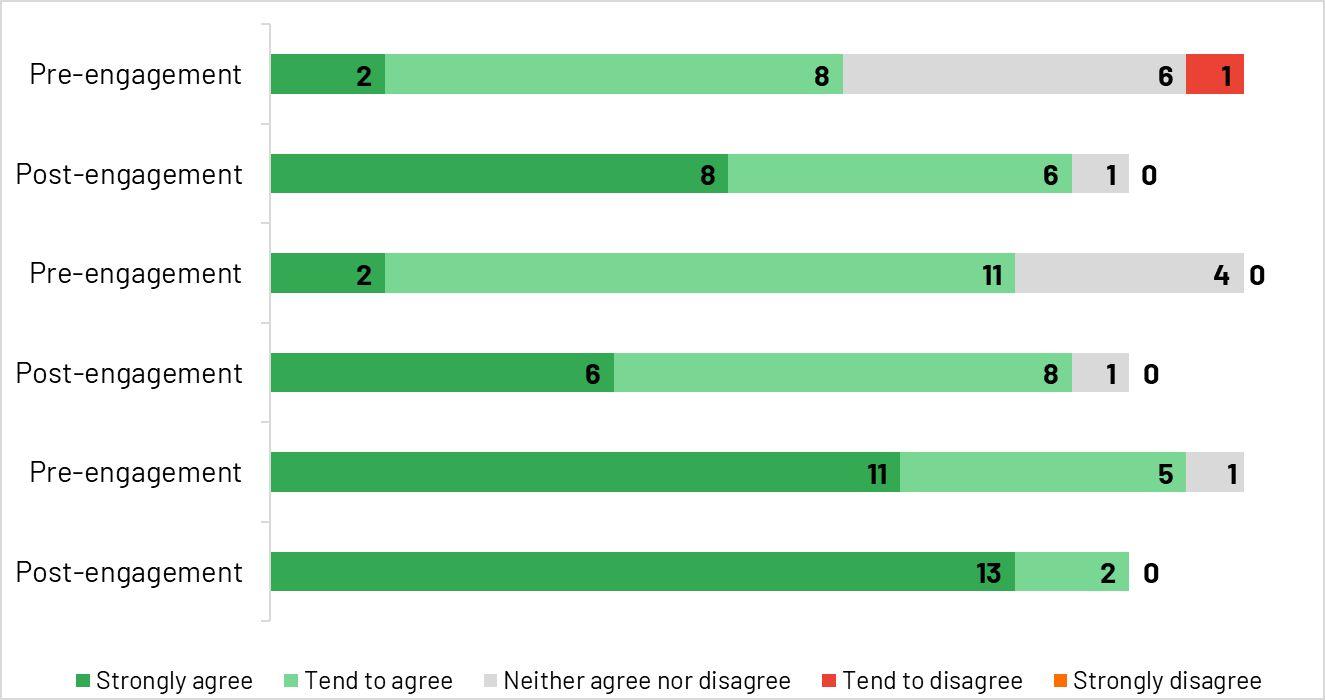
Across all statements, participants generally felt more confident in their knowledge LA’s plans, the purpose of the engagement, and that their contributions would be used by their LA. The strength of agreement also increased universally as well - although fewer participants completed the post-engagement form*.
1Source: Ipsos Political Monitor, July 2023
Participantexperience
Post-first and final session participant questionnaires


Participants’ views on energy-use in Gateshead and heat networks remained consistent between the first and final sessions - although more felt confident about the future of energy in Gateshead after the final workshop.

*Response rate:
Post first-engagement: 17 responses
Post all engagements: 15 responses
After the final workshop, some participants reported having learned about heat networks and energy-use from the workshops, with some citing this as a reason why their expectations for the impact of the workshops had changed.
I didn’t know about heat networks before this
Participantexperience
Post-engagement questionnaire
Participants were overall very positive about the process
Please describe how you are feeling at the end of the Gateshead Citizen Visioning

*Response rate:
Post first-engagement: 17 responses
Post all engagements: 15 responses


Three participants said…

The vast majority of participants were satisfied with the communication and support, with the ability to ask important questions to them, understood all information from speakers and that other participants respected what they say.

Participantexperience
Post-engagement questionnaire
Participants expressed what impacts they hope to see from this engagement project. Their reflections focused on affordable, green energy, investment into the community, and the council taking on and responding to their recommendations.
For me/my household

“Affordable green energy for the community”
“That my opinion counts and to see the benefits in the work being done by the council”
“Retrofit opportunities”

*Response rate:
Post first-engagement: 17 responses
Post all engagements: 15 responses
“Cheaper, green energy”
In the local area
“Greener energy being available to all soon”

“Investment into community centres”
“A better area overall that’s greener”
“At best, an adoption of the recommendations we've made into policy and a wider publicity of the vision as the core of local government policy, leading into successful adoption of green energy technology and policies that help the environment and the people.”
Participantexperience
Is informative, fun and you have a sense of achievement at the end or the process
Maria

The Residents Forum has been a great process to be involved in. The people of our community are at the heart of the recommendations as they're the ones who are impacted by any changes.
Abbie
It was informative, interesting and gave opportunities to ask questions to a range of people. The recommendations come from local people so our voices are heard
Amanda
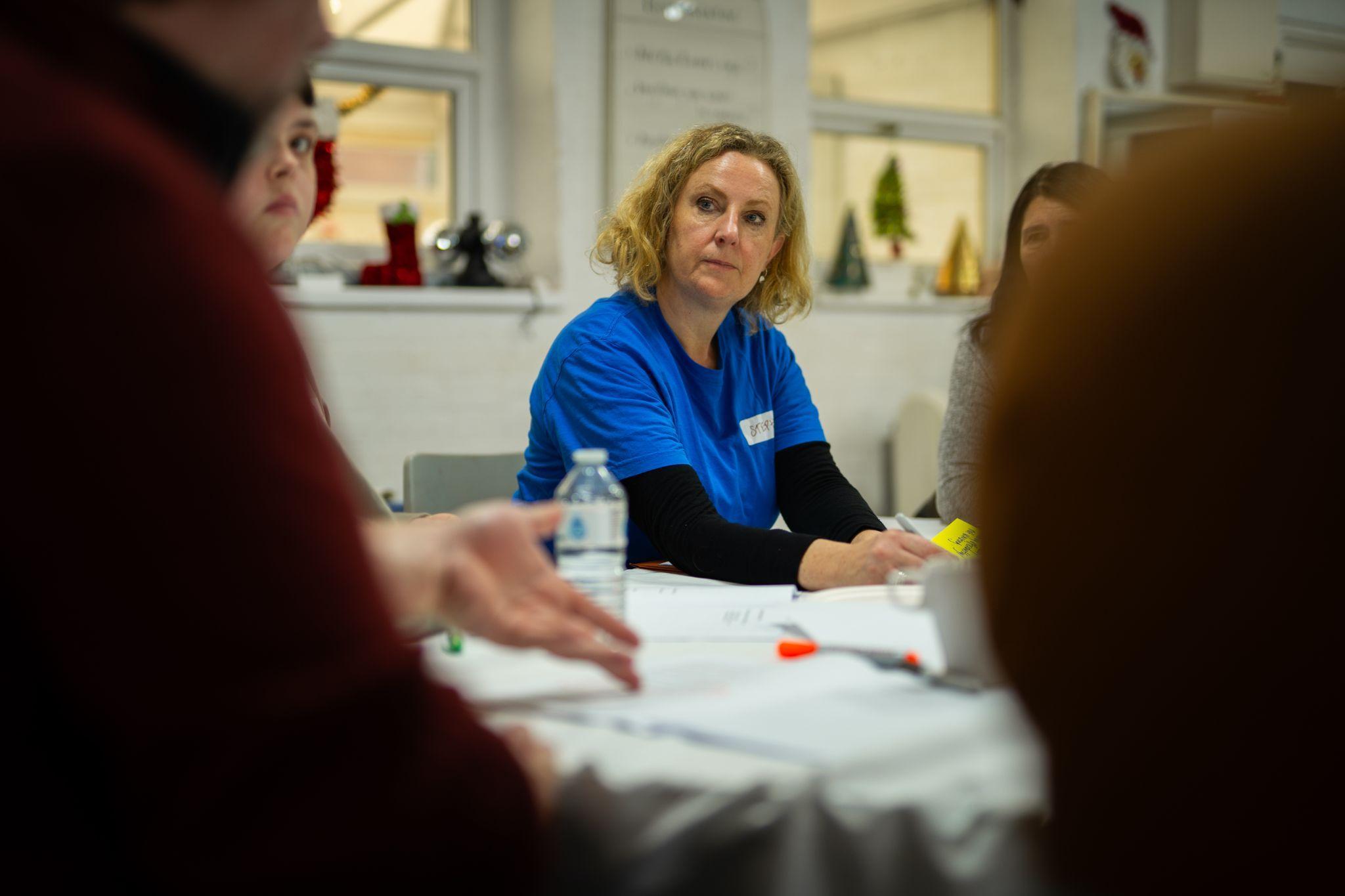
While the process format is guided, the contents are entirely the work of community members. I have a fundamental distrust of government, but this appears to be a genuine effort by Gateshead Council to gauge what residents and ordinary people want. This is a really important step in making truly democratic decisions that are by the people and for the people.
Josh

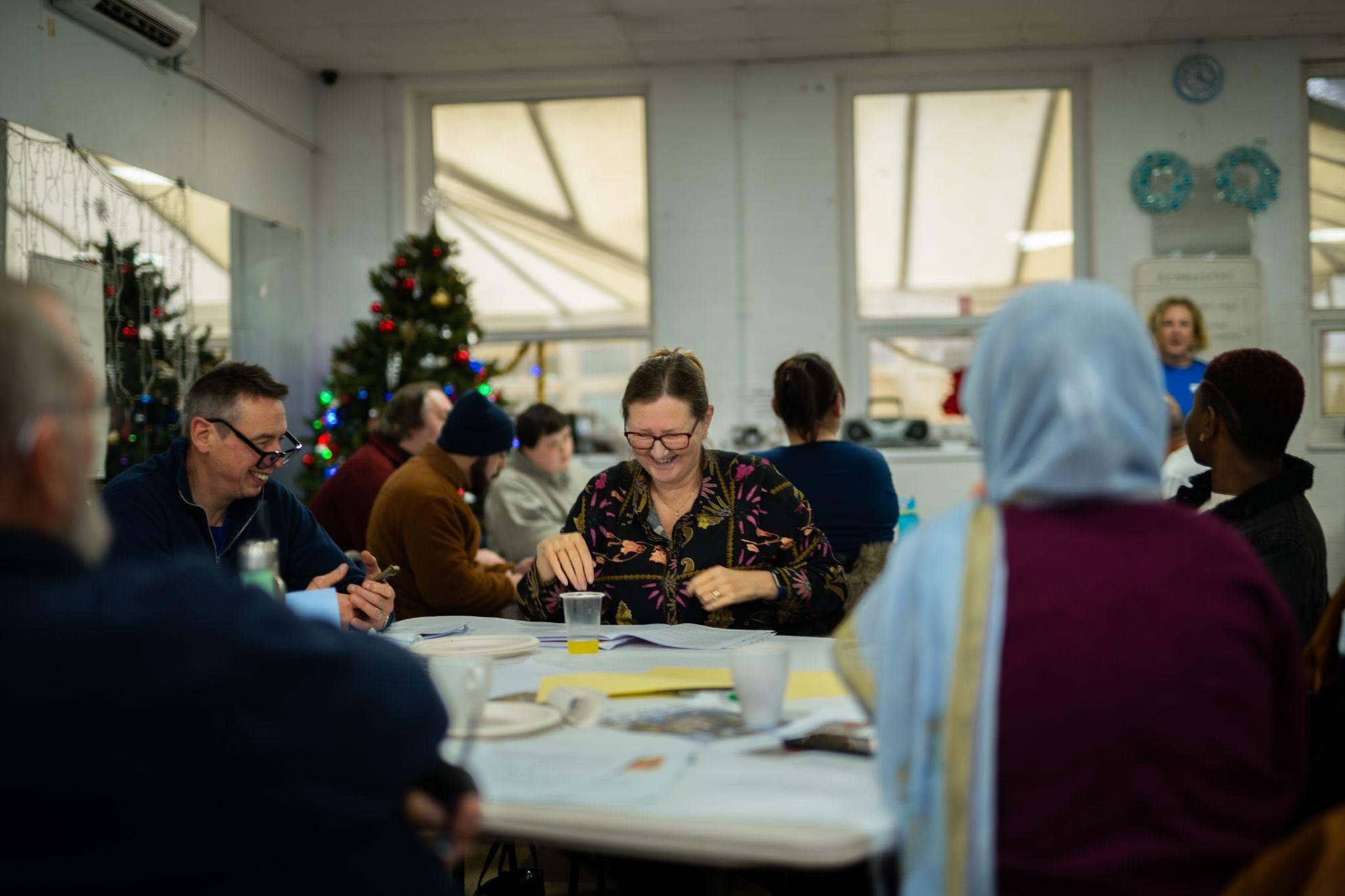
Participantexperience
Taking part in the residents Forum makes a difference.
Without our input we don’t get what we want Megan

The Residents Forum has been amazing. Community led projects are important to allow the council to get a community based vision
Sarah

It enables you to participate in the decision-making process in your local community alongside your fellow citizens. Our recommendations are important because they represent the views of your fellow citizens. They are grounded, informed and relevant. John
The Residents Forum gained knowledge in future plans whilst giving your opinion and viewpoints whilst listening to others. It's important if you want your views listened to and taken into consideration. Phil




Levelofsupportforrecommendations
At the end of the forum, participants voted on their level of support for each recommendation. They used a four-point scale:
● Love it - great, fully support this idea
● Like it - might not have been your
first choice but you think it is a good idea and would be happy to see it happen
● Live with it - definitely not your
first choice, but you could live with it if it happened
● Loathe it - I really wouldn’t want to see that happen in Gateshead
Recommendation
s for Gateshead
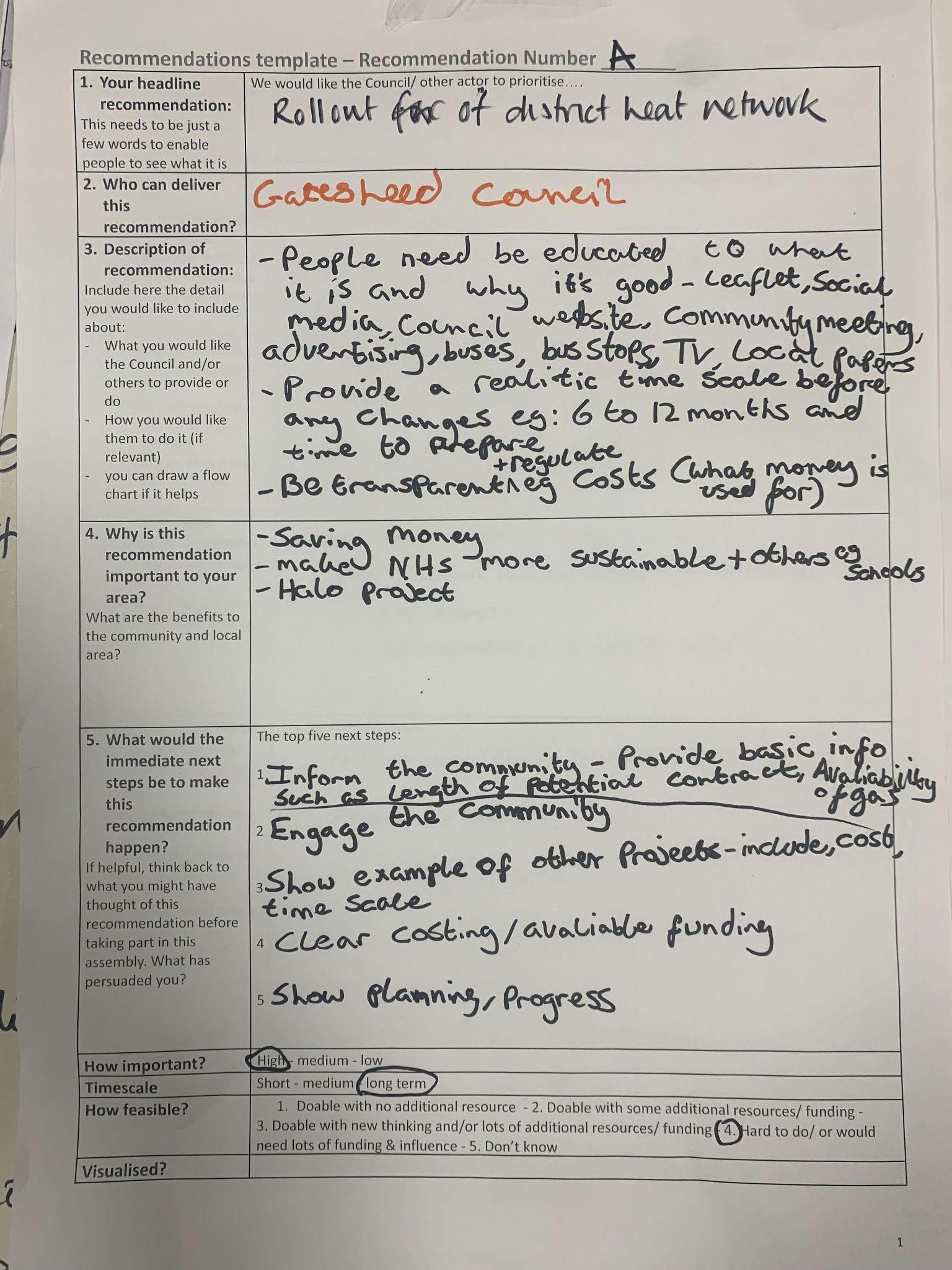
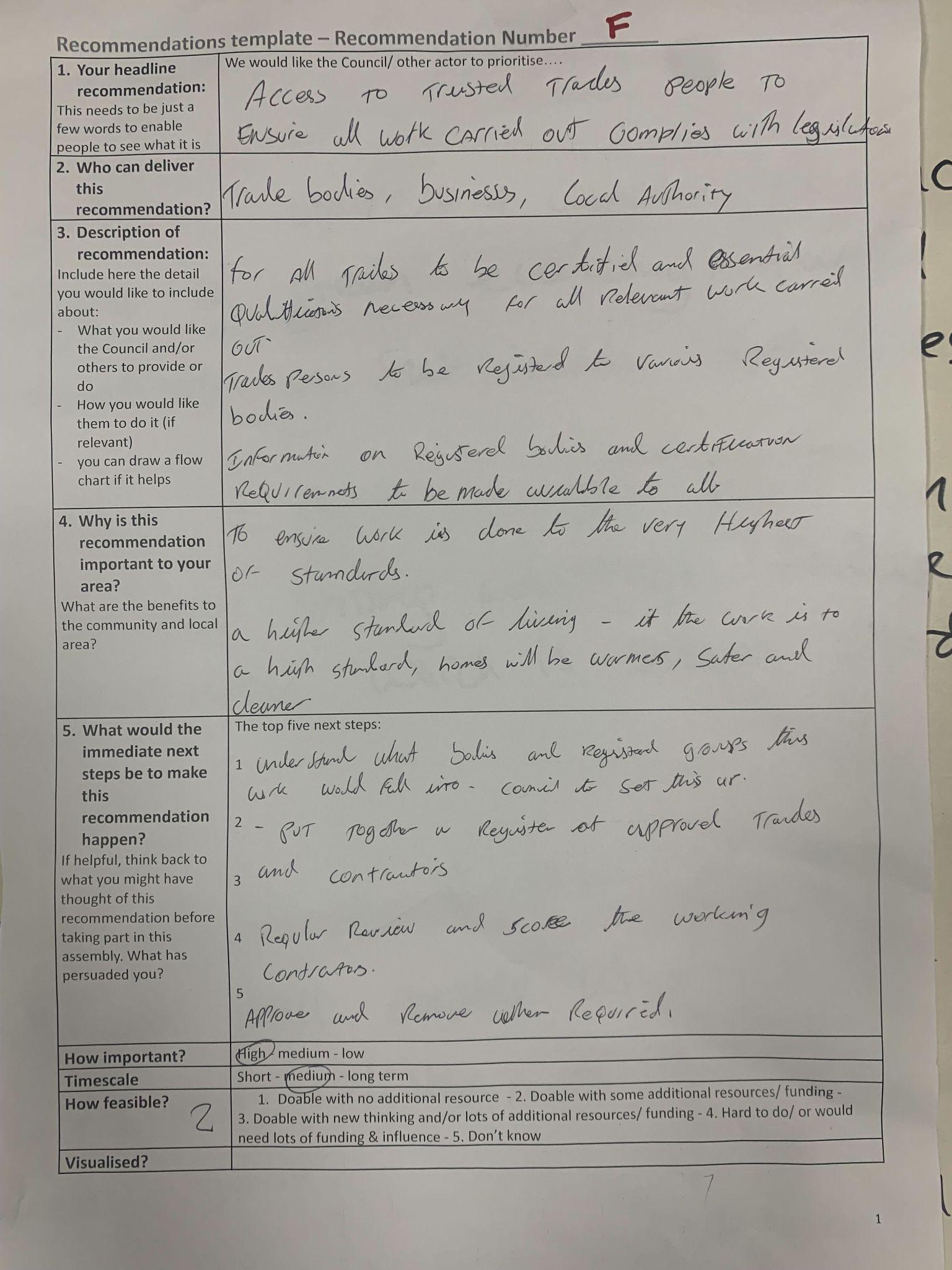
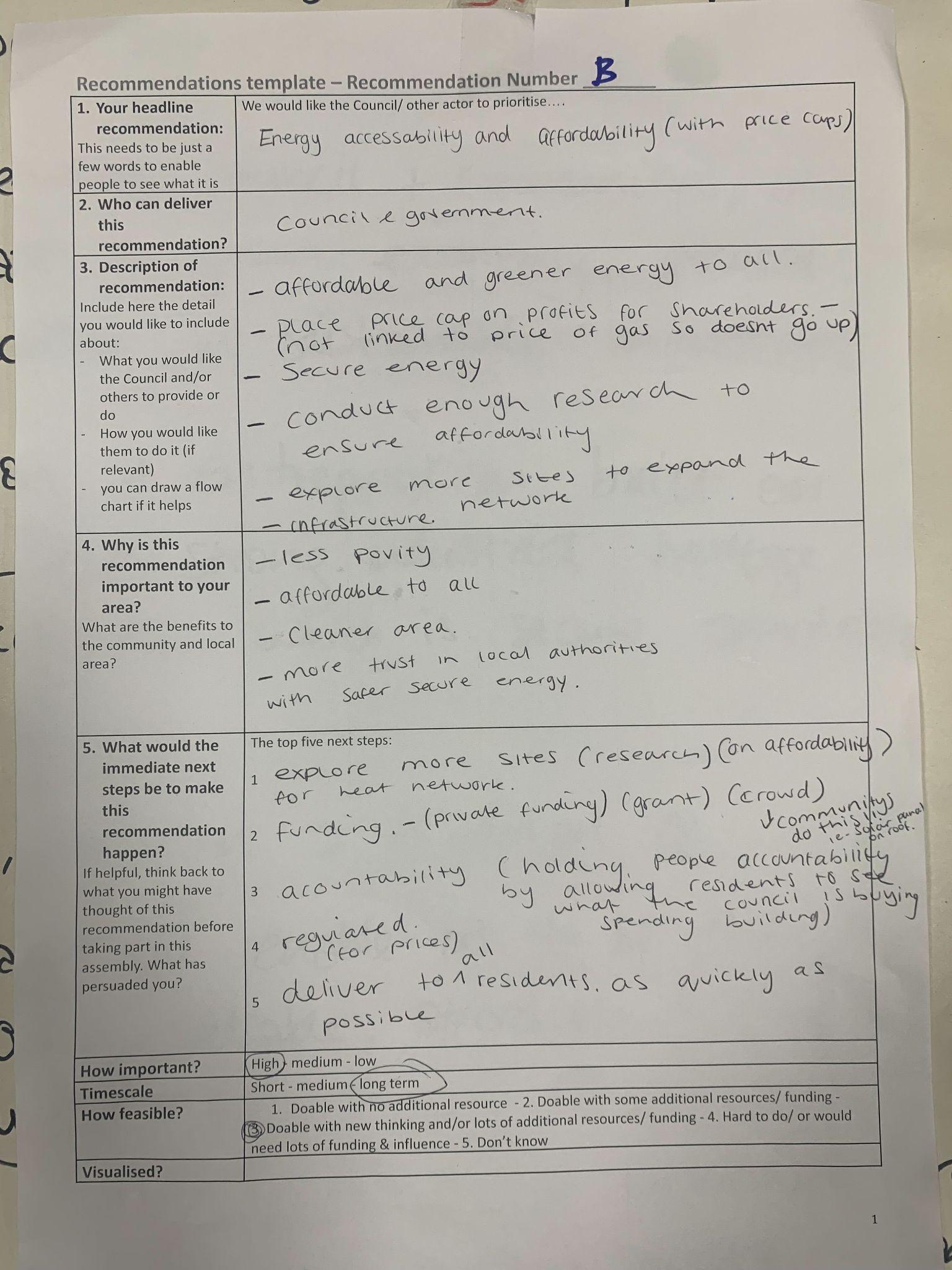
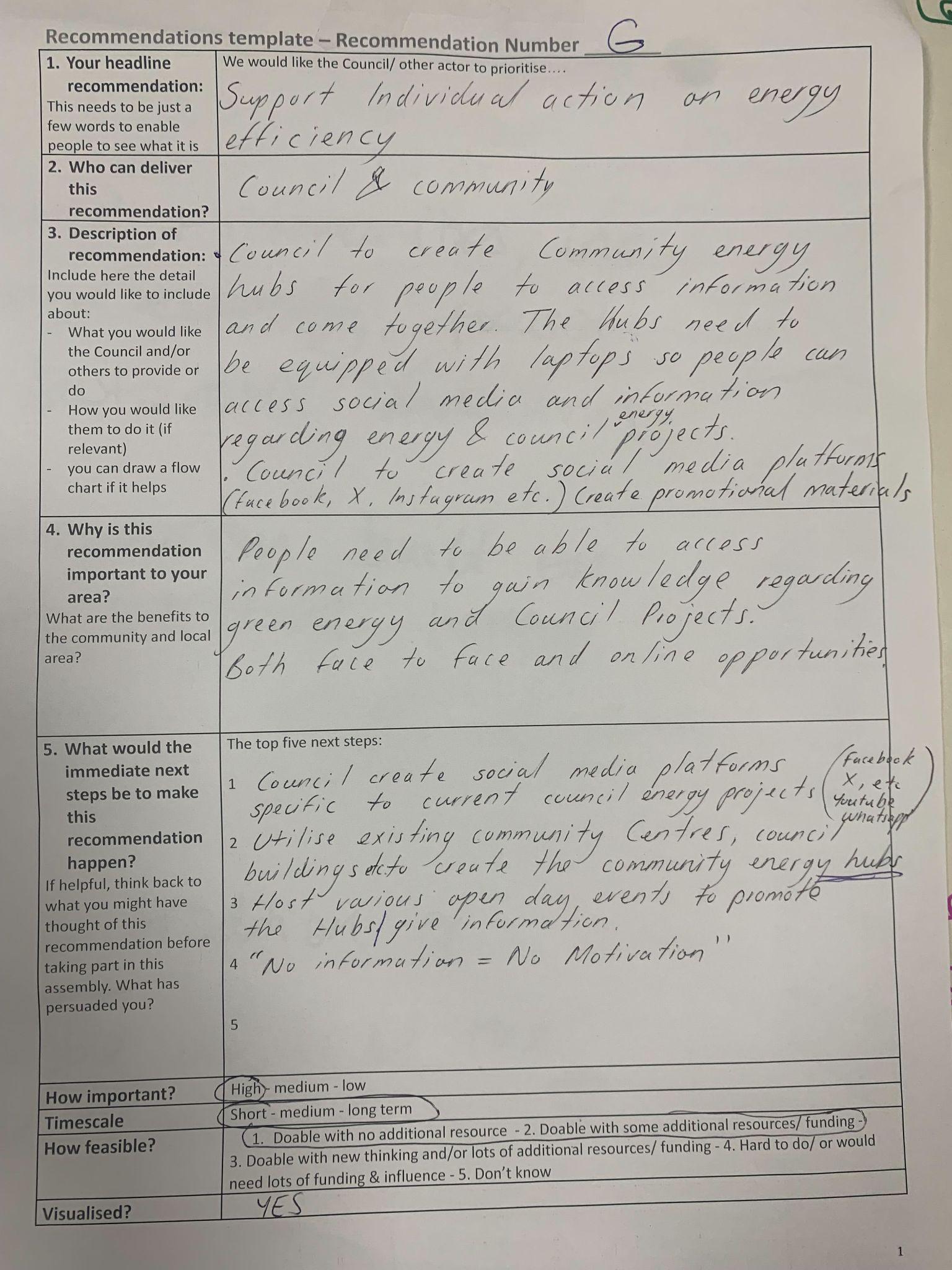
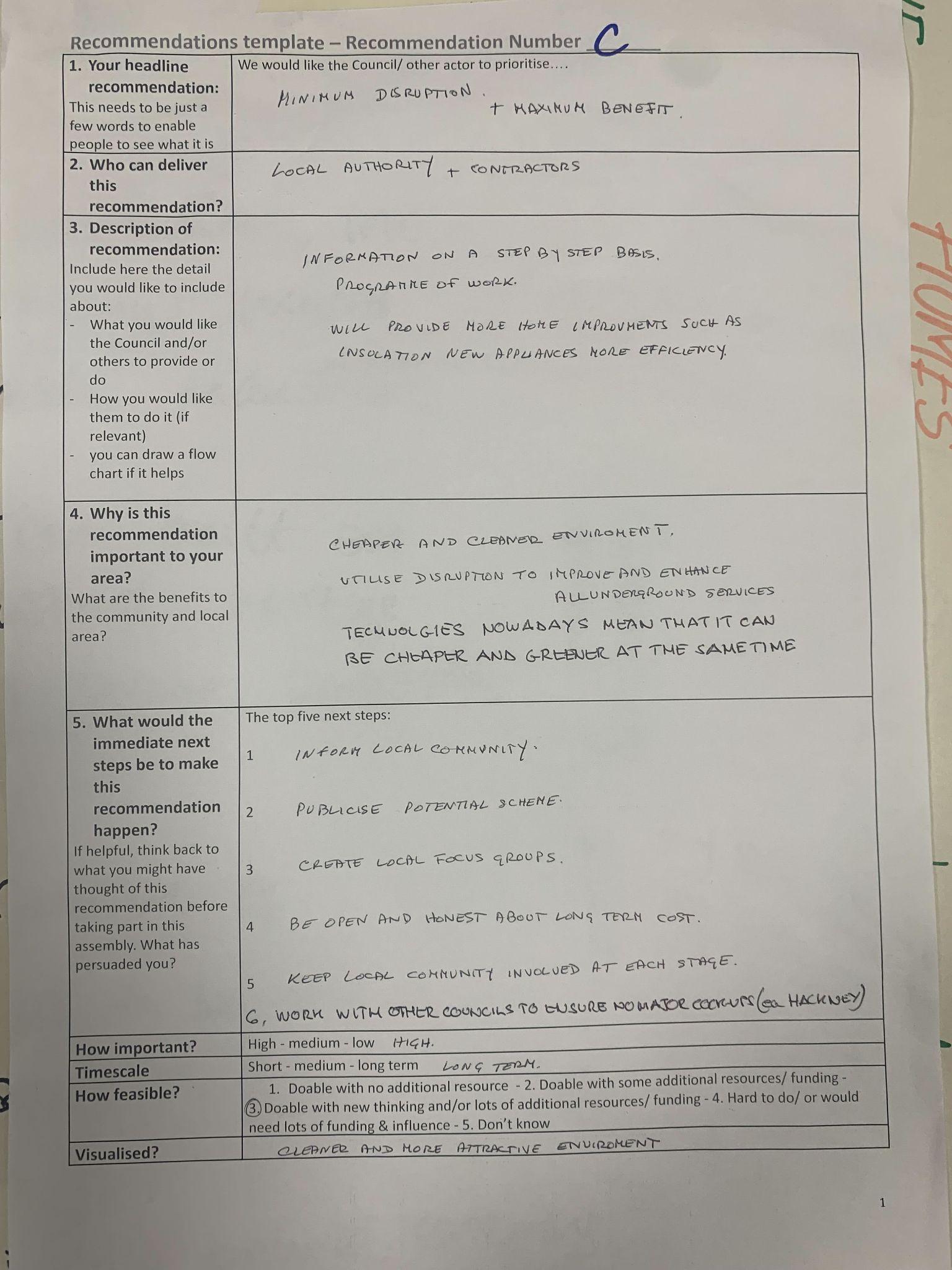
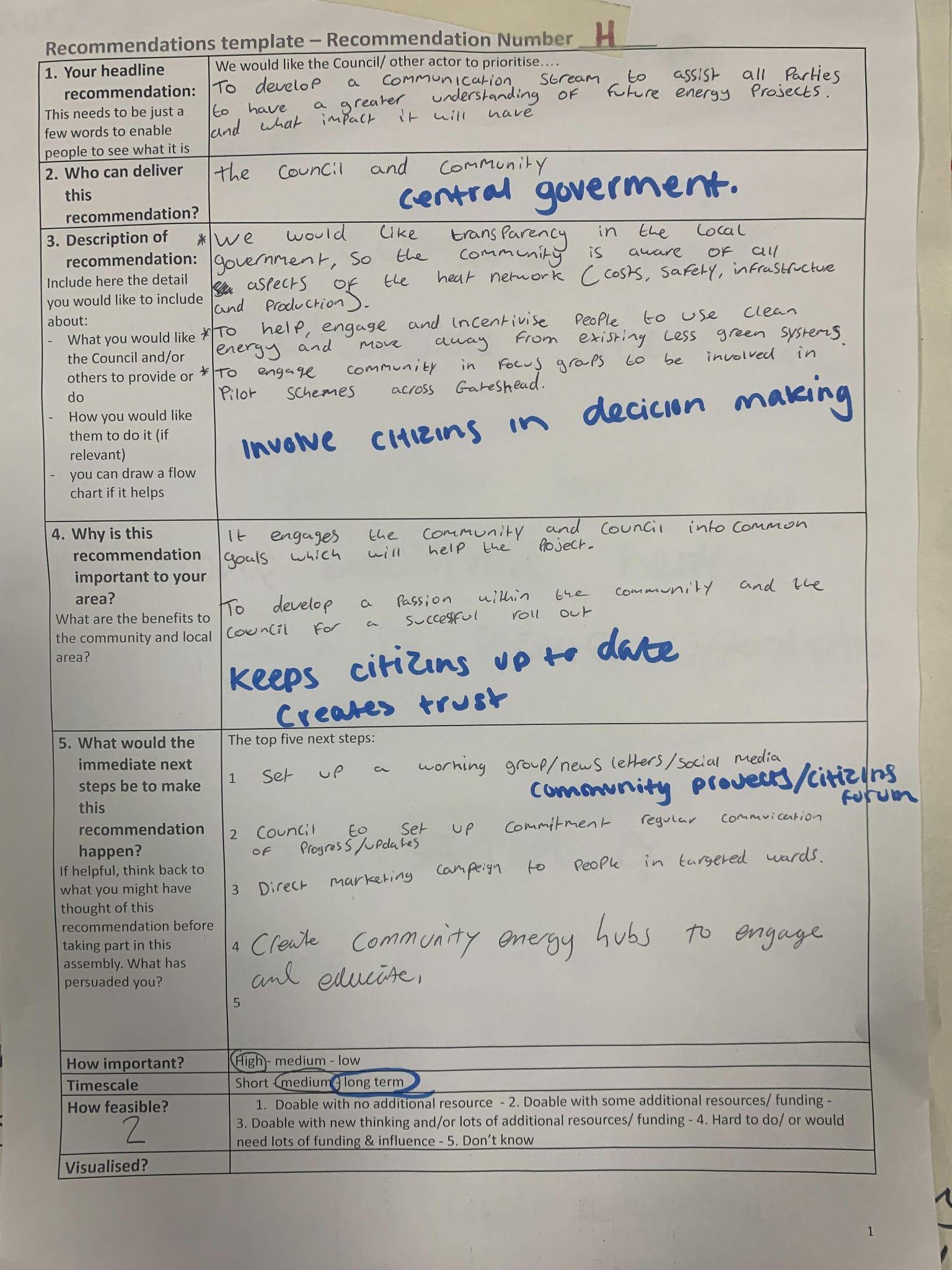


NetZeroLivingprogramme
This project was funded by Innovate UK as part of the Net Zero Living programme which aims to help regional authorities accelerate the transition to net zero.
Involve, Forum for the Future, Ipsos and Quantum Strategy & Technology were appointed to support 25 ‘Fast Follower’ local authorities with their work on visioning and citizen engagement.
Around a third of the UK’s carbon emissions are dependent on sectors that are directly shaped or influenced by local authority practice, policy or partnerships. Many of the technological solutions needed to move places to net zero already exist, but local authorities face many challenges and barriers when trying to deliver these solutions at the scale needed.
The cohort of 52 funded places across the UK are delivering projects to overcome the non technological barriers to delivering net zero in a place.
